Deciding where to plant roots can be a huge decision for Veterans and military families. Active duty service members can face even more pressure when the time nears for them to transition back into civilian life.
To help Veterans, service members and military families plan their next steps, Veterans United put together a list of the Best Places for Veterans to Live.
We’ve conducted a comprehensive analysis of 23 different factors, surveying more than 599 Veterans to determine our weighting system based on real Veteran opinions. We then scored 605 Metropolitan Statistical Areas (MSAs) and Micropolitan Statistical Areas (μSAs) across all 50 states based on these Veteran-determined weights and factors.
We gave extra consideration to financial factors like cost of living and home prices to emphasize affordability. That makes this list especially useful for Veterans hoping to use their VA home loan to put down roots in a community they can truly call home.
Learn more about how we scored each city in our methodology.Note: For the purpose of creating a diverse geographic list, we’ve limited each state to two city appearances per list. See the unfiltered list.
Best Cities for Veterans to Live
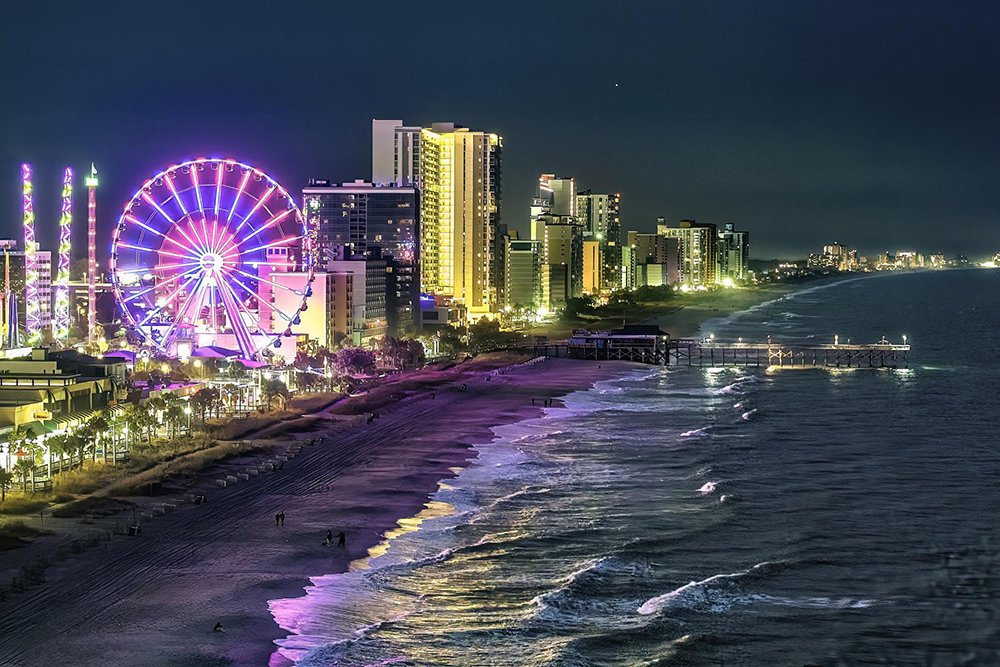
1. Myrtle Beach-Conway-North Myrtle Beach, SC
Making a new appearance and taking the top spot on this year’s Best Cities for Veterans list is the Myrtle Beach-Conway-North Myrtle Beach metro area in South Carolina. With over 28,000 Veterans living in the area, making up nearly 8% of the population, this region offers a strong sense of community and a lifestyle built around support and sunshine.
The Myrtle Beach area ranks highly in several categories important to Veterans: seventh in community support and fourth in quality of life infrastructure. Along with its strong access to fresh foods and median air quality index (AQI) of 41, Myrtle Beach also has one of the highest entertainment and food venue densities on our list, with more than 38 venues for every 10,000 residents and is ideal for those who enjoy an active social life or family outings.
While it landed in the middle of the pack for financial well-being (No. 13 of 25), it makes up for this through Veteran-friendly tax policies. South Carolina may offer a full property tax exemption for Veterans with a disability and does not tax military retirement pay, leaving more room in Veterans’ budgets.
The Myrtle Beach area is one of the fastest-growing metro areas in the U.S., attracting both retirees and young families. Veterans have access to the Myrtle Beach VA Clinic and nearby Ralph H. Johnson VA Medical Center, while families can explore more than 60 miles of sandy beaches and over 100 golf courses. The area also hosts the popular Military Appreciation Days every May, featuring parades, concerts and community picnics.
Beyond its military roots, Myrtle Beach boasts a lively boardwalk, a growing food scene and attractions like Brookgreen Gardens and the SkyWheel, offering year-round entertainment for all ages.
With ocean views, generous tax exemptions and a vibrant Veteran community, Myrtle Beach-Conway-North Myrtle Beach sets the tone for what a supportive and enjoyable home base can look like.
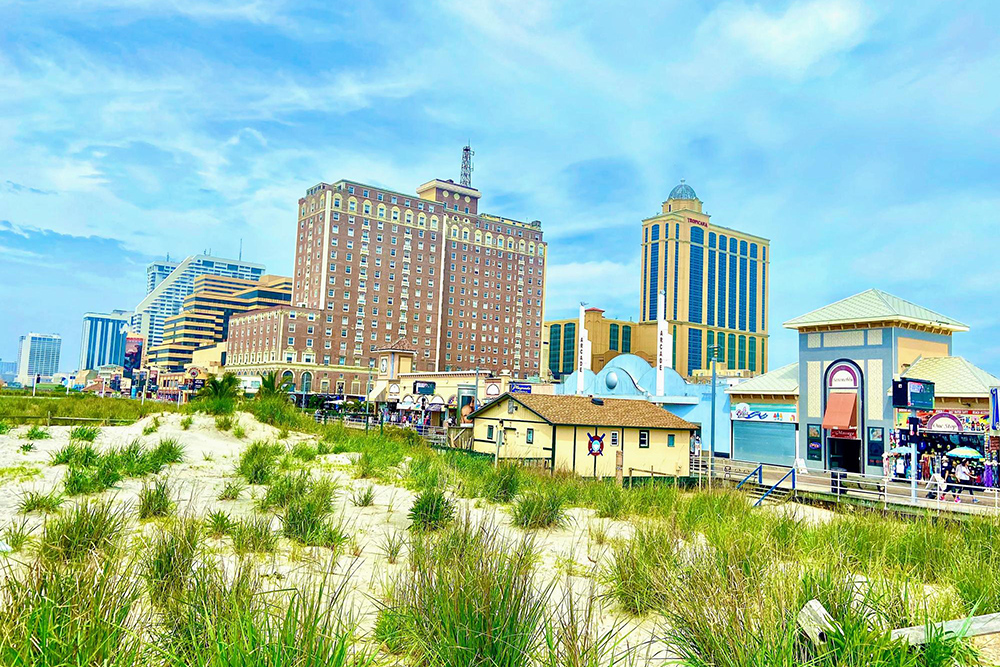
2. Atlantic City-Hammonton, NJ
Ranking second on our Best Cities for Veterans list is Atlantic City in the Hammonton metro area in New Jersey, up from the 34th spot last year. While known for its historic boardwalk, iconic casinos and vibrant beach culture, this area offers more than just entertainment. It also provides strong community support and a Veteran-friendly policy landscape.
Atlantic City-Hammonton ranked No. 1 of the top 25 for infrastructure, accessibility and quality of life. The category is informed by factors such as access to food, amenities and overall livability. Veterans can enjoy one of the highest ratings of entertainment and dining venues among these top 25 cities, with 15 venues per 10,000 residents. It also ranked sixth for community support and second for Veteran population growth year over year, making it an increasingly popular destination for former service members.
New Jersey also has benefits at the state level with the second highest PreK-12 rank and the lowest Veteran unemployment rates in the nation. The state also offers full property tax exemption for Veterans with a disability and does not tax military retirement income, earning top marks for Veteran tax benefits; however, this does not come without some tradeoffs.
New Jersey ranked 24th out of 25 in financial well-being, suggesting higher living costs or lower housing affordability. Health care access also ranked lower at No. 20, though the MSA did perform better in terms of access to VA health facilities at No. 9.
Atlantic City offers more than a bustling boardwalk; it’s also a city in transition, with revitalization efforts focused on small businesses, public safety and community health. The metro’s location near Joint Base McGuire-Dix-Lakehurst offers career and transition opportunities for former service members, while the city itself is home to several Vet Centers and community-based organizations.
Families can enjoy weekend outings to Steel Pier, the Atlantic City Aquarium or nearby Hammonton, known as the “Blueberry Capital of the World” and home to scenic farms and wineries.
Atlantic City-Hammonton may not be the most affordable metro on our list, but its combination of Veteran-friendly tax policies, robust amenities and a growing support network makes it an appealing option for those looking for a vibrant place to call home.
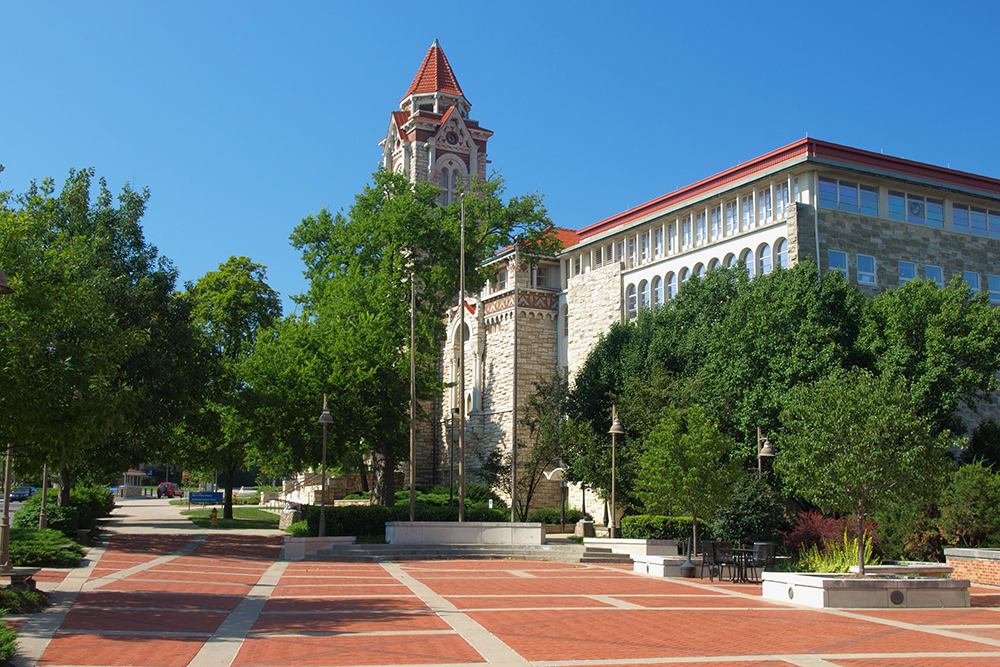
3. Lawrence, KS
Lawrence, Kansas, is another new addition to this year’s Best Cities for Veterans list, ranking at No. 3. Located in the northeastern part of the state, Lawrence blends small-town charm with a lively cultural scene, bolstered by its status as a college town.
Lawrence scored high in several areas that Veterans told us matter most: air quality, health care access and physician availability. It’s No. 1 of the top 25 for VA healthcare and benefits facilities per capita and rated No. 2 for healthcare overall. It has a strong showing for medical resources, with about 11 medical doctors per 10,000 residents, and it benefits from a relatively low median air quality index of 42.75, the fourth-best on our list.
As home to the University of Kansas, Lawrence pulses with energy, offering Division I athletics, music venues and an active arts scene. Veterans benefit from the Lawrence VA Clinic and proximity to the Colmery-O’Neil VA Medical Center in Topeka, plus resources through KU’s Military-Affiliated Student Center.
Downtown Massachusetts Street, affectionately known as “Mass Street,” is a local gem full of locally owned shops, coffeehouses and eateries. Outdoor enthusiasts can enjoy Clinton State Park and its 7,000-acre lake, while families appreciate the highly rated schools and community-oriented events held throughout the year.
Though the city ranked lower in community support (No. 23), it holds its own with a moderate cost of living. Kansas also offers a partial exemption on both military retirement pay and property taxes for Veterans with a disability.
If you’re seeking great access to health care and VA benefits, along with a decent cost of living, Lawrence is worth a closer look.
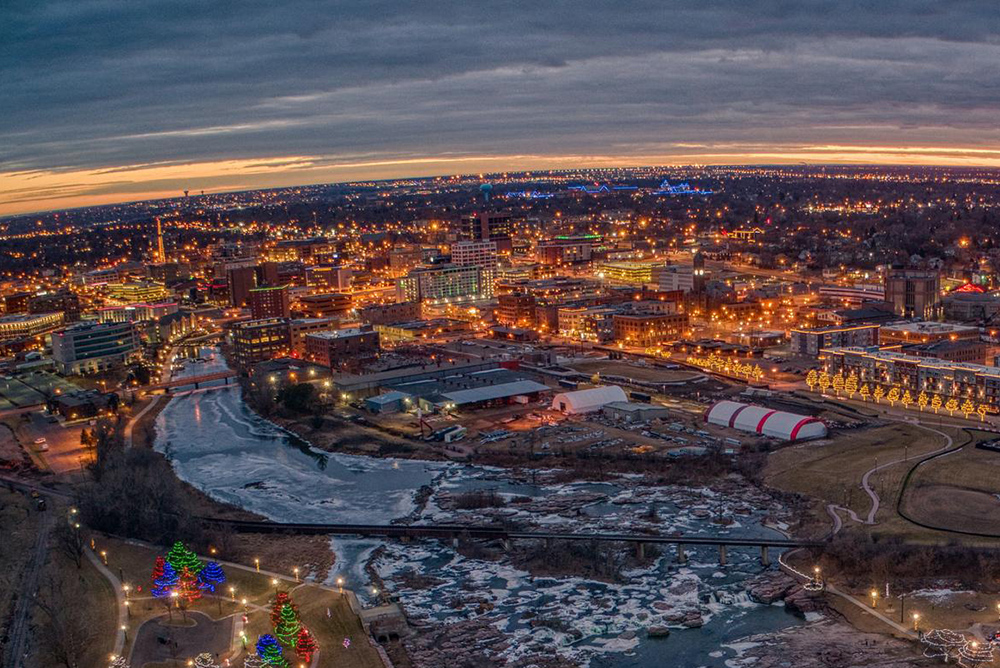
4. Sioux Falls, SD-MN
Ranking fourth is Sioux Falls, a metro area located near the border of South Dakota and Minnesota. It continues to stand out as a Veteran-friendly destination after being ranked at No. 10 last year.
Sioux Falls performed especially well in our health care category, ranking No. 4 of 25, thanks in part to an impressive 101 medical doctors per 10,000 residents, one of the highest ratios in our study. Along with excellent access to healthcare, the air quality is top-notch, with a median AQI of 33.
Sioux Falls is one of the Midwest’s most dynamic small cities, known for its rapid growth, low unemployment and vibrant downtown. The city’s entertainment-to-population ratio is strong, with over 28 venues per 10,000 people.
Veterans can receive care through the Sioux Falls VA Health Care System and find support through local organizations like the VFW and American Legion. Also, South Dakota offers partial exemptions on retirement income and property taxes for disabled Veterans.
The city’s Falls Park features a stunning series of waterfalls, historic buildings and walking trails that anchor community life. Sioux Falls also hosts regular farmers markets, outdoor concerts and festivals like the SculptureWalk. For families, the area boasts strong public schools, a low crime rate and one of the nation’s highest concentrations of pediatricians and family doctors.
While its financial well-being score landed at No. 14, the city makes up for it with robust health care resources and access to activities in both urban and natural spaces. If a strong medical system and a friendly Midwestern feel are priorities, Sioux Falls delivers.
Sioux Falls is known for being a big, small town. There’s an affordable, strong job market, no state income tax, highly rated public schools and plenty of outdoor recreation. People travel to Sioux Falls from all over the world to hunt and fish.”
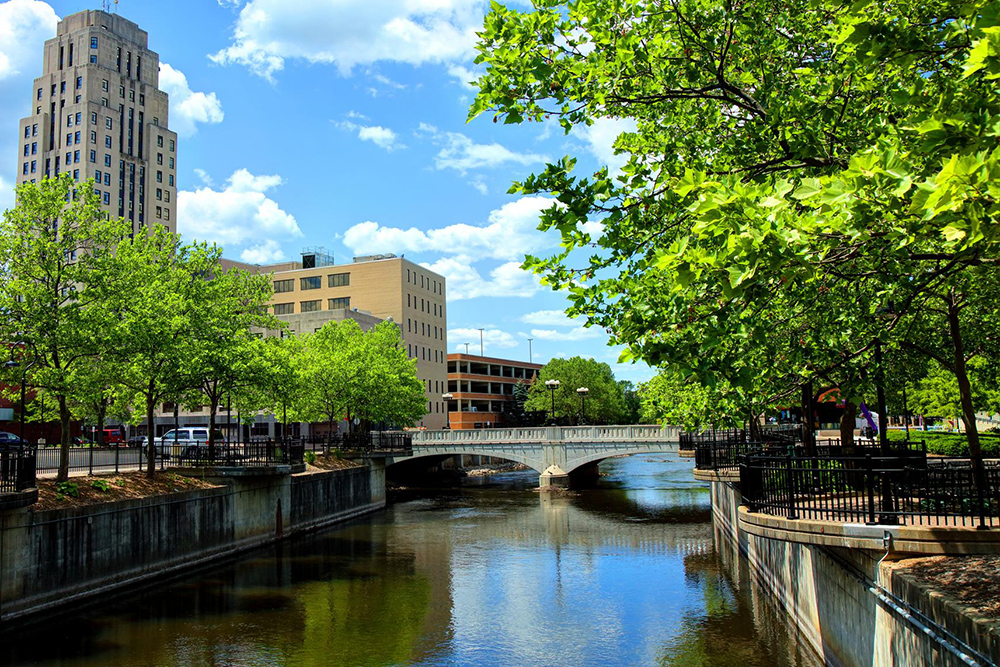
5. Battle Creek, MI
Coming in at No. 5 is another new addition to the Best Cities for Veterans list: the Battle Creek, Michigan metro area. Known as the birthplace of breakfast cereal and home to quiet parks and rivers, Battle Creek ranked first of the top 25 for community support, a category that factors in Veteran population share, growth and available services.
Battle Creek also ranked No. 5 in health care and financial well-being and was rated No. 2 for access to VA facilities per capita, thanks in part to the Battle Creek VA Medical Center and proximity to Fort Custer Training Center, which reinforces the region’s military ties. The city has a solid cost of living, and its tax landscape is favorable, with full exemptions for both military retirement pay and property taxes for Veterans with disabilities.
Battle Creek offers a mix of affordability and legacy. As the birthplace of Kellogg’s and the cereal capital of the world, it hosts the annual National Cereal Festival, features a downtown art walk, a growing brewery scene and unique local attractions like the Leila Arboretum, home to the whimsical Fantasy Forest sculpture garden.
Outdoor enthusiasts can explore the Binder Park Zoo, one of the top zoos in the Midwest or bike the scenic Linear Park Trail that winds through rivers, parks and neighborhoods. Battle Creek also hosts major events like the Field of Flight Air Show & Balloon Festival, the Backyard Burgers & Brews Fest and the International Festival of Lights in winter. From live music festivals to farmers markets and historic sites, Battle Creek offers a vibrant, small-city experience with deep roots and modern appeal.
While it had one of the lower scores for quality of life infrastructure (No. 25), Battle Creek’s strengths lie in affordability and community cohesion. If you’re seeking a close-knit Veteran community in a lower-cost Midwestern city, Battle Creek might be your match.
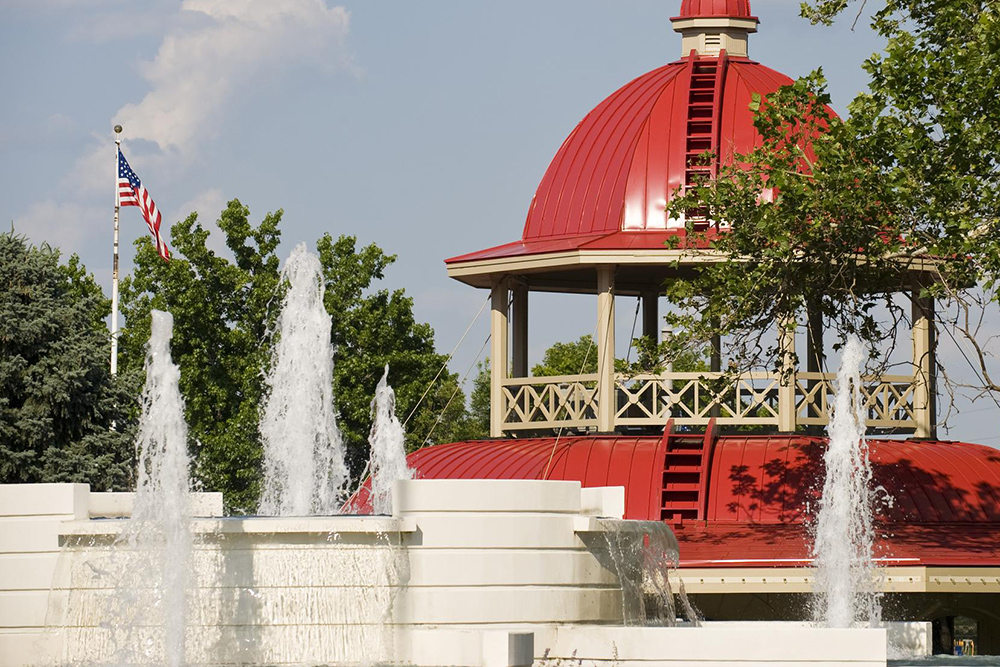
6. Decatur, IL
At No. 6 is Decatur, Illinois, a centrally located city with a strong industrial past and an emerging arts scene. The city was ranked the best affordable place to live for Veterans in 2024 and that has continued into this year. Decatur ranked first of the top 25 in financial well-being, which is bolstered by affordable housing, moderate taxes and low cost of living metrics.
Veterans in Decatur benefit from favorable tax policies, with full exemptions on both disability property taxes and military retirement income. The area also has a strong social scene, with over 24 entertainment and food venues per 10,000 people, and it’s supported by solid healthcare availability (No. 10 out of 25).
The city is nestled along Lake Decatur, offering easy access to fishing, boating and miles of scenic walking trails. Outdoor enthusiasts can enjoy Nelson Park, complete with picnic areas, disc golf and summer concerts at the Devon Lakeshore Amphitheater. Families often visit Scovill Zoo and the Children’s Museum of Illinois, while nature lovers appreciate the tranquility of Rock Springs Conservation Area
Veterans can access care through the local VA clinic, and additional support is available at the Illinois Veterans Home in nearby Quincy for those in need of long-term services. The community also honors its Veterans through annual events and memorials, including observances at Central Park in the heart of downtown. With a strong sense of community, accessible health resources and a range of family-friendly activities, Decatur offers both comfort and connection.
Decatur is also home to Millikin University, which provides educational and cultural opportunities in the area. Its revitalized downtown features local shops, restaurants and a popular Saturday farmers market that draws families and neighbors together each week.
While it scored lower in quality of life infrastructure (No. 20), Decatur is a great option for those looking for affordability and simplicity without sacrificing Veteran-specific support. Its central location and accessible amenities make it a smart pick for budget-conscious Veterans.
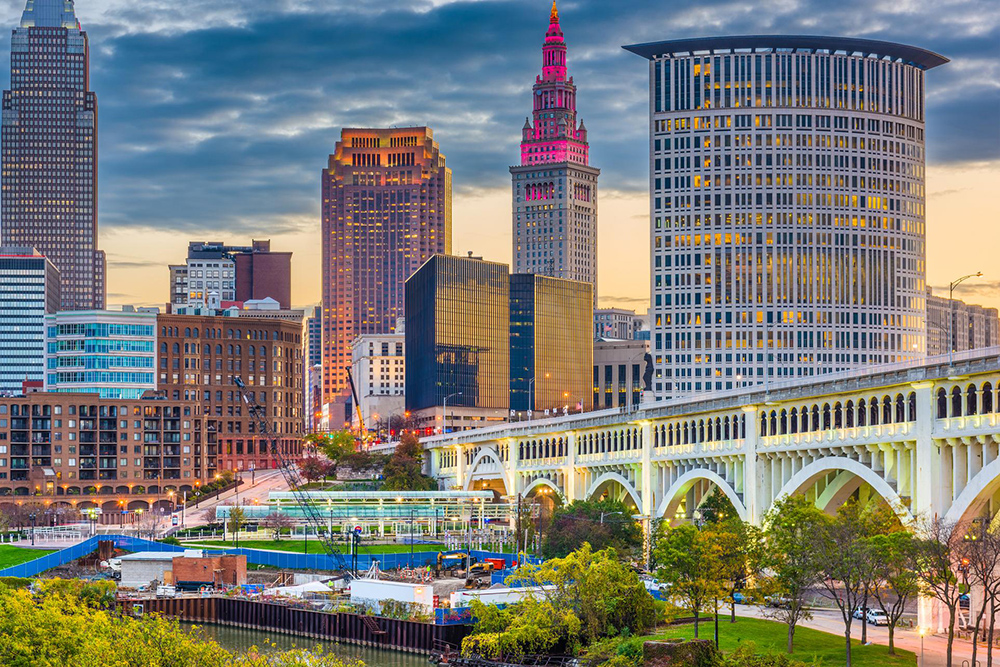
7. Cleveland, OH
Making its way into the top 10 is Cleveland, Ohio at No. 7. This Great Lakes city is known for its rich history, waterfront recreation and robust hospital systems. Out of the top 25, Cleveland ranks No. 9 in health care and facilities, with nearly 33 doctors per 10,000 people and multiple nationally ranked hospitals within reach.
Cleveland also has one of the largest Veteran populations on our list at over 111,000, which helps strengthen the availability of local Veteran services. The city ranked in the top 10 for financial well-being (No. 7) and the state of Ohio fully exempts military retirement pay from being taxed.
The city is home to several nationally recognized health institutions, including the Cleveland Clinic and Louis Stokes Cleveland VA Medical Center, giving Veterans and their families access to some of the best care in the country.
Cleveland offers a vibrant mix of urban living and lakeside recreation. Located on Lake Erie, the city features waterfront parks, beaches and trails like Edgewater Park and the Cleveland Lakefront Bikeway. Cultural highlights include the Rock & Roll Hall of Fame, Playhouse Square and a world-renowned art museum. Sports fans, foodies and music lovers all find something to love in Cleveland’s lively neighborhoods.
While its community support score was more middle-of-the-road (No. 16), Cleveland's size, health care depth and strong infrastructure make it an attractive place for Veterans looking for big-city benefits at Midwestern prices.
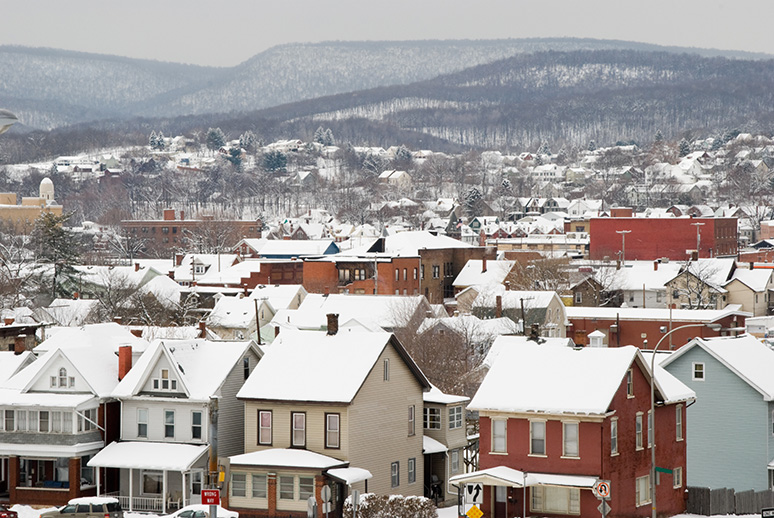
8. Altoona, PA
For the second year in a row, Altoona, PA has made its way onto our list of Best Cities, advancing from the number nine spot to eighth. With just under 122,000 people in the MSA and nearly 70 Veterans per 1,000 residents, Altoona offers one of the highest Veteran population densities in the top 25.
Altoona ranked No. 9 of the top 25 for financial well-being and community support, No. 11 for healthcare and facilities and No. 12 for infrastructure, accessibility and quality of life, giving it one of the most balanced metro profiles.
Veterans also benefit from full exemptions on 100% disability-related property taxes and military retirement income in Pennsylvania. The city scored solidly across the board, with a strong Veteran support presence and over 25 entertainment and food venues per 10,000 residents — a robust figure for a smaller metro.
Altoona offers the comforts of a close-knit community with a backdrop of natural beauty. Located in the Allegheny Mountains, the city is a short drive from scenic destinations like Canoe Creek State Park and the Horseshoe Curve, a National Historic Landmark.
Veterans can access care through the James E. Van Zandt VA Medical Center which is located in town and offers a wide range of services. The area also maintains strong local traditions with seasonal festivals, minor league baseball games and active civic groups that help create a sense of belonging for Veterans and families alike.
If you're seeking a quiet, affordable place with reliable health care access and a solid Veteran network, Altoona could be a great fit.
While Altoona maintains its small-town charm, it's conveniently located within driving distance of larger metropolitan areas like Pittsburgh and Harrisburg. This proximity provides residents with access to additional employment opportunities, cultural experiences, and entertainment options.”
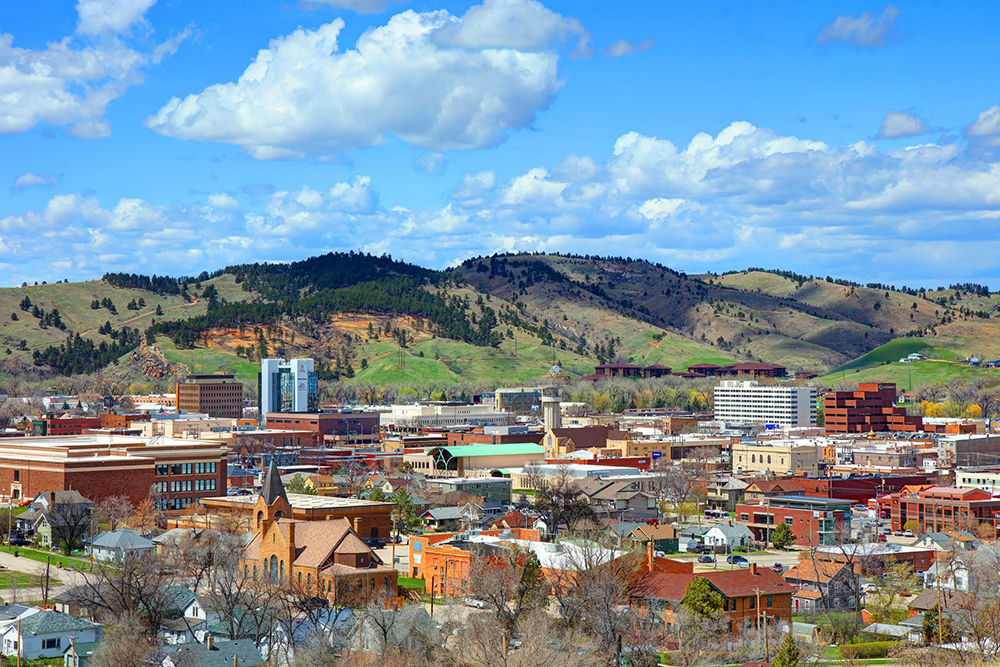
9. Rapid City, SD
At No. 9 on our list is Rapid City, South Dakota. Set against the scenic backdrop of the Black Hills, this metro ranked No. 4 of the top 25 for community support and No. 14 for health care availability.
Rapid City has the third-highest Veteran population per capita among the top 25 cities, with about 99 Veterans per 1,000 residents. It also offers a strong entertainment density (33 venues per 10,000 people) and more than 24 doctors per 10,000 people. While it ranked a bit lower in financial well-being (No. 18), the state of South Dakota exempts military retirement pay from being taxed.
The city is a gateway to some of America’s most iconic landscapes, including Mount Rushmore, Badlands National Park and Custer State Park. It offers abundant opportunities for hiking, wildlife viewing and scenic drives through the Black Hills. The city also has a strong sense of patriotism, hosting events like the Black Hills Veterans March and Stand Down gatherings that connect Veterans with essential services and support. Downtown, visitors can enjoy Main Street Square, local shops, public art and seasonal festivals.
Health care access is supported by the VA Black Hills Health Care System, which includes a hospital and community-based outpatient clinics. Downtown offers public art, local breweries and family-friendly events, while nearby outdoor areas provide endless opportunities for hiking, camping and wildlife viewing.
With easy access to nature, a deep sense of service and a growing community of Veterans, Rapid City is an attractive option for those looking to settle in the northern Midwest.
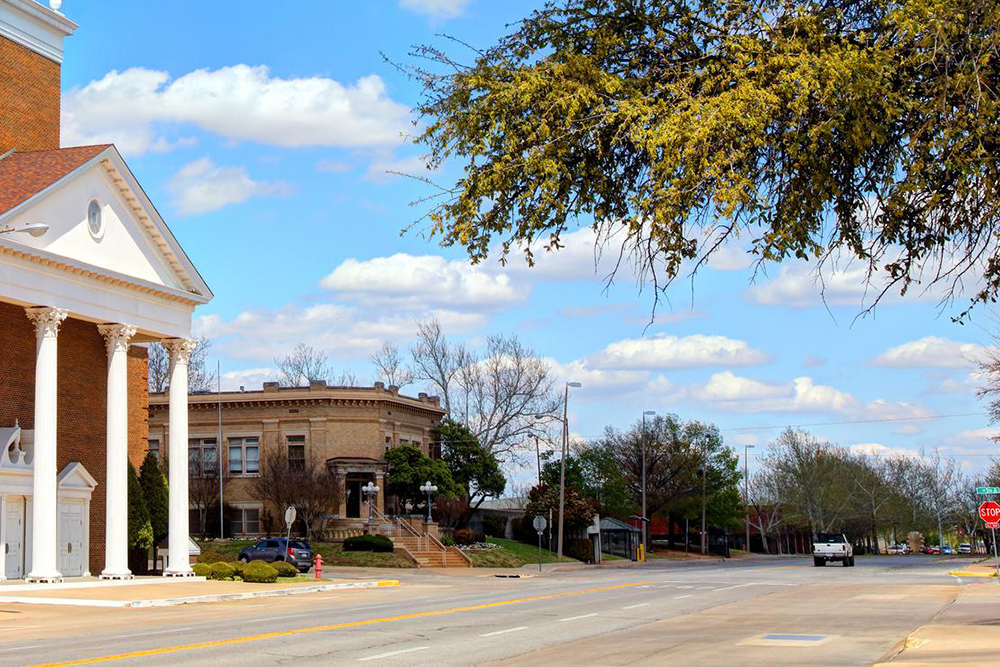
10. Lawton, OK
Ranked No. 10 is Lawton, Oklahoma — a military-anchored city with one of the highest concentrations of Veterans in the country. With about 112 Veterans per 1,000 residents, Lawton holds the highest Veteran population per capita in our top 25 list.
Lawton also scored highly in financial well-being (No. 3) and community support (No. 5). The city is home to Fort Sill, which bolsters its military identity and resources. Veterans benefit from immediate access to on-base services as well as the Lawton VA Clinic. Oklahoma offers full exemptions on both retirement pay and property taxes for Veterans with a disability, further supporting its strong affordability scores.
The city is surrounded by natural beauty, including the Wichita Mountains Wildlife Refuge, where residents enjoy hiking, rock climbing and spotting longhorn cattle and bison. The refuge also offers scenic drives, fishing lakes and stunning views from Mount Scott.
Lawton also features a growing arts district, home to local galleries, murals and community events. The Museum of the Great Plains is a well-known attraction that highlights regional history through interactive exhibits. Family-friendly spaces like Elmer Thomas Park provide walking trails, picnic areas and a splash pad for kids.
Though it scored lower for infrastructure and quality of life (No. 23), Lawton’s strong sense of camaraderie, military presence and accessible cost of living make it a solid choice for many transitioning service members.
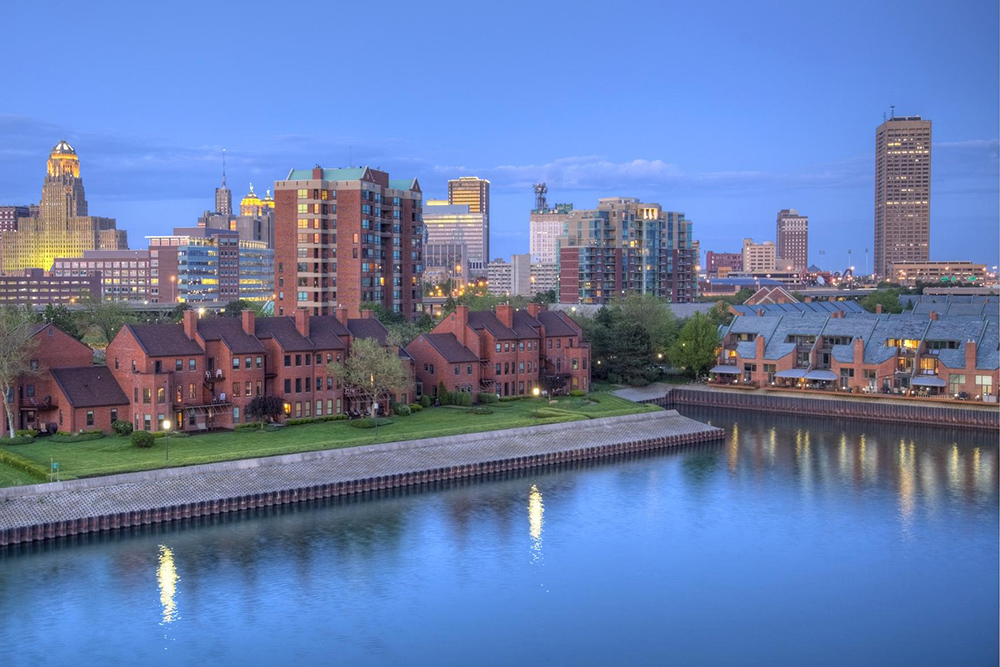
11. Buffalo-Cheektowaga, NY
Buffalo-Cheektowaga comes in at No. 11 on our list. This New York metro has over 58,000 Veterans, and while it’s larger than many of the others in our top 25, it still offers a surprisingly tight-knit feel for Veterans.
This MSA scored No. 7 for infrastructure and quality of life and performs well in community support and access to basic services. Buffalo has more than 25 entertainment and food venues per 10,000 people and nearly 13 physicians per 10,000 residents.
Though New York provides only partial property tax exemptions, Buffalo still managed a respectable No. 11 of 25 in financial well-being. The state of New York also placed a respectable sixth among all the states, in part due to having one of the highest-rated education systems in the country.
Buffalo offers a mix of affordability, history and revitalization. The area is home to the Buffalo VA Medical Center and multiple Vet Centers, which provide strong health support for Veterans.
Beyond medical care, the region is rich in cultural offerings. Residents can explore the waterfront at Canalside, tour Frank Lloyd Wright architecture or attend NHL games and live music downtown. With Niagara Falls just a short drive away and a growing food scene that celebrates everything from wings to Polish pierogies, Buffalo offers big-city culture with a hometown feel.
If you’re looking for a midsized metro with lakefront access, cultural depth and solid Veteran support, Buffalo is worth considering.
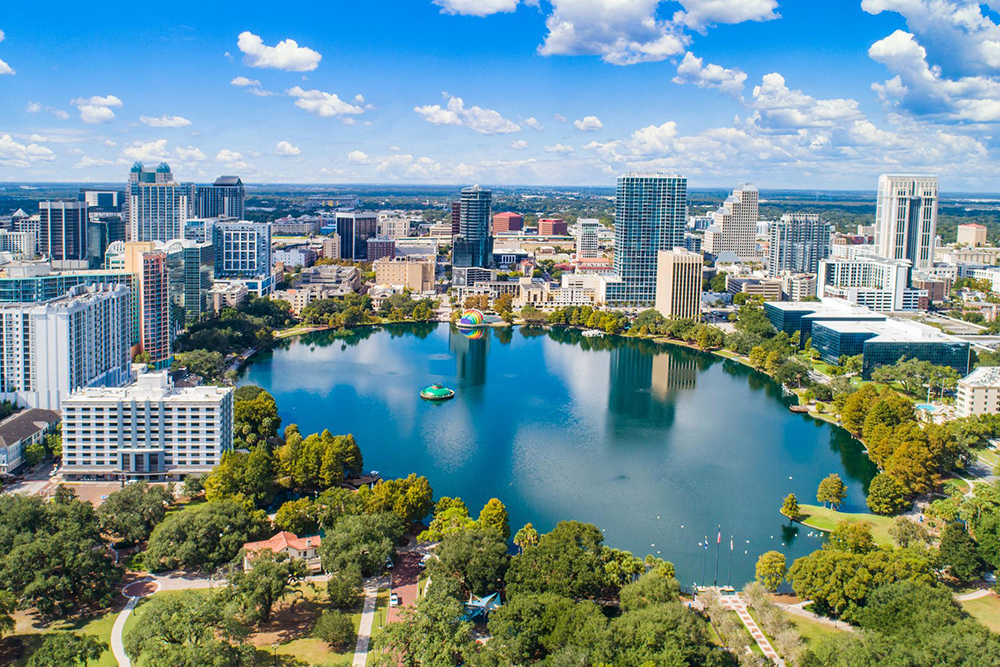
12. Orlando-Kissimmee-Sanford, FL
At No. 12 is the Orlando-Kissimmee-Sanford metro in Florida — a warm-weather destination that’s more than just theme parks. This large MSA has over 138,000 Veterans, placing it among the most populated Veteran hubs on our list.
Orlando ranked No. 2 of the top 25 for infrastructure and quality of life, which includes everything from food access and air quality to general livability. Florida also offers full tax exemptions on both military retirement pay and 100% disability-related property taxes.
While Orlando did rank lower in financial well-being (No. 20) and healthcare access (No. 24), it’s a solid choice for Veterans who aren’t worried as much about money and are prioritizing entertainment, weather and strong state-level tax benefits.
Orlando is best known for theme parks, but the region has become a major destination for full-time residents, including thousands of Veterans. The Orlando VA Medical Center in nearby Lake Nona offers extensive specialty care.
The area also features year-round sunshine, hundreds of lakes and easy access to beaches and nature preserves. Veterans and their families can enjoy everything from farmers markets and food truck nights to state parks and professional sports teams. The region’s growing tech and health sectors also offer career opportunities.
For those seeking a warm climate with endless things to do, Orlando continues to be a magnet for Veterans of all ages.
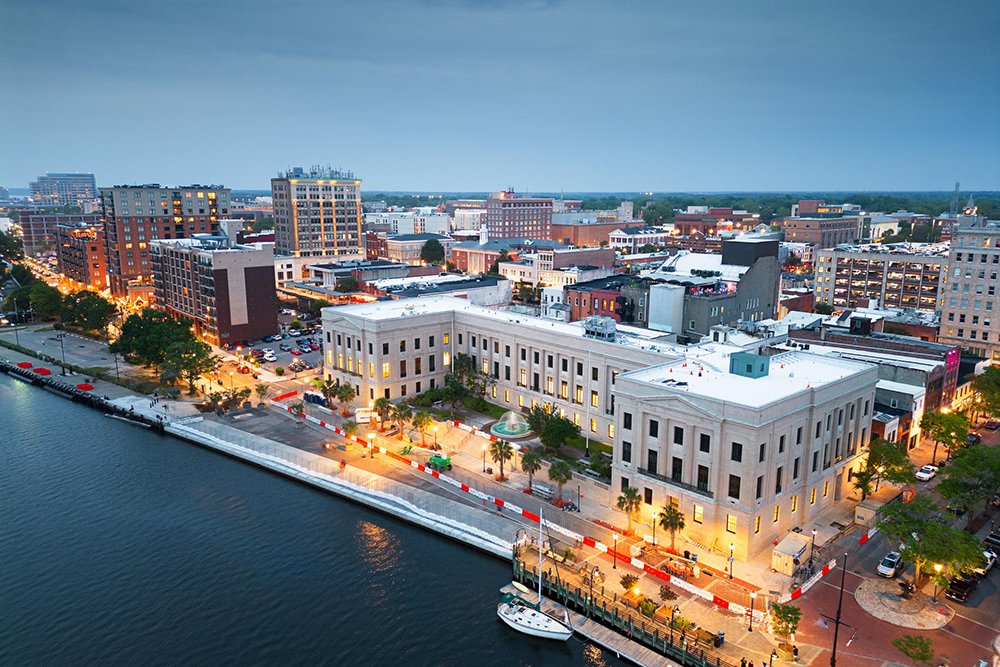
13. Wilmington, NC
Wilmington, North Carolina, ranks No. 13 on our list of Best Cities for Veterans. Located along the Cape Fear River and just minutes from Atlantic beaches, Wilmington blends coastal charm with a growing support system for Veterans.
This MSA ranked No. 2 of the top 25 in community support, and the area also offers relatively high access to entertainment and dining, with over 32 venues per 10,000 people. North Carolina also offers partial exemption for property taxes for disabled Veterans and complete exemption from retirement income taxes, which helps offset some of the area’s higher cost of living, as it ranked 23rd in financial well-being.
Wilmington blends Southern hospitality with a laid-back coastal lifestyle. Veterans can receive care at the Wilmington VA Clinic and access additional support through nearby installations like Camp Lejeune. The city has also invested in expanding greenways, public transit and public safety.
The city’s historic downtown features riverfront restaurants, boutiques and museums, while Wrightsville Beach and Carolina Beach are just a short drive away. Wilmington is also a filming hotspot, with a long history in television and film production, adding creative energy to its scenic surroundings. For Veterans attracted to culture, coastline and a slower pace of life, Wilmington has a lot to offer.
Although health care access ranked lower (No. 21), Wilmington’s scenic surroundings, growing Veteran network and vibrant cultural life make it a compelling option for those drawn to the coast.
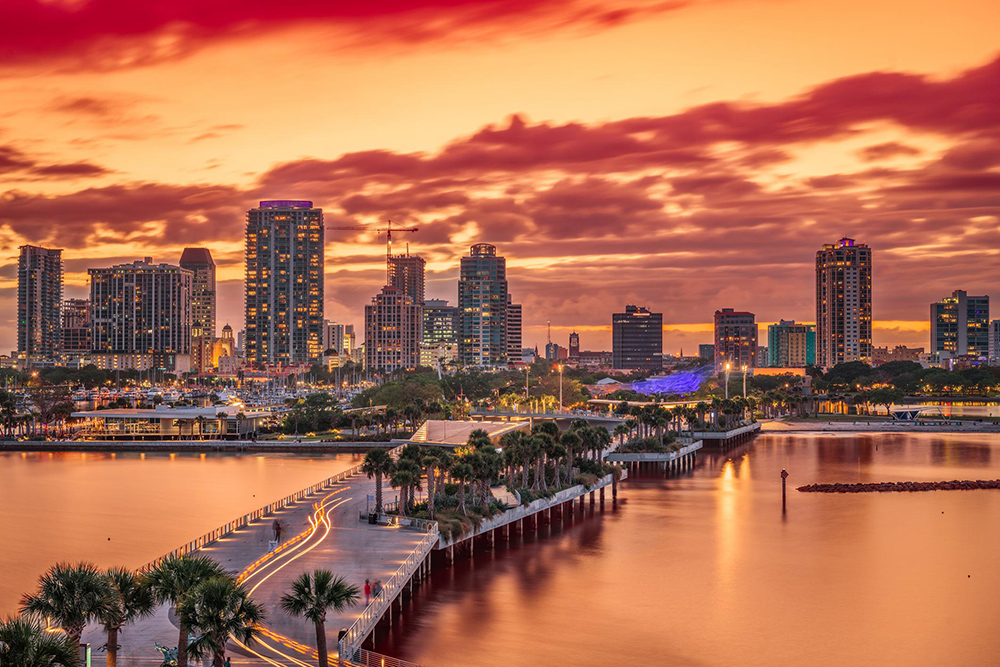
14. Tampa-St. Petersburg-Clearwater, FL
At No. 14 is the Tampa-St. Petersburg-Clearwater metro area in Florida, a large, sunny region with over 223,000 Veterans. Last year, this area was at number one, due to many of the same reasons it made this year’s list. Tampa ranked fifth in infrastructure, accessibility and quality of life, thanks to its beaches, public amenities and access to fresh foods.
Florida provides full exemptions on both military retirement pay and disability-related property taxes, adding appeal for long-term financial planning. While Tampa scored lower in health care access (No. 17) and financial well-being (No. 21), its warm climate and strong PreK-12 education (11th out of 50) remain strong draws.
The Tampa Bay area offers the perks of a big city with the relaxed vibe of a coastal community. Veterans benefit from proximity to the James A. Haley Veterans' Hospital and Bay Pines VA Healthcare System, both of which are known for comprehensive care. The area has a strong military presence, with MacDill Air Force Base located just outside downtown Tampa.
The city’s walkable neighborhoods, award-winning beaches and extensive public parks system provide ample ways to stay active. Tampa also offers professional sports, a growing tech industry and frequent community events, making it a well-rounded city.
For those prioritizing weather, outdoor activity and generous tax policies, Tampa continues to be a reliable choice.
The clear blue skies, sunshine, and balmy winds are No.1 in Tampa. There are also many different types of home settings within Tampa and the surrounding areas. Buyers can choose to live at the beach, in the country, in the city, or in the suburbs. The State offers many benefits to Veterans and service members, including reduced or a 100% exemption from property taxes, motor vehicle fees, access to County parks, and education fees.”
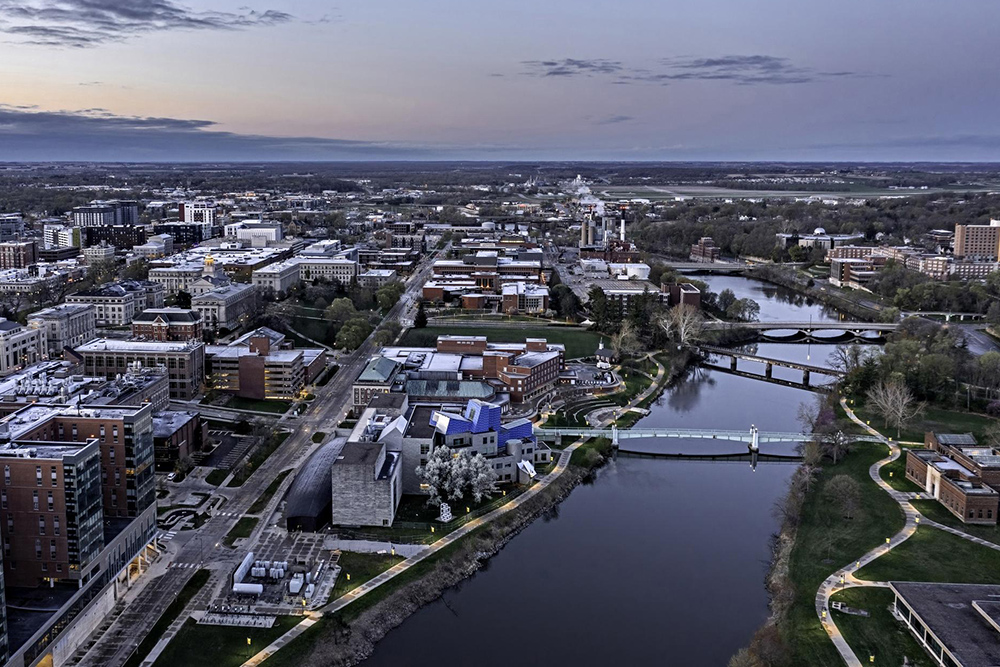
15. Iowa City, IA
Ranked 15th is Iowa City, a vibrant college town in eastern Iowa. While it has the lowest Veteran population per capita in the top 25, Iowa City makes up for it with strong health care and infrastructure scores.
The city ranked No. 6 for health care and air quality, with a median AQI of 38, and No. 14 in infrastructure and livability. It holds a respectable No. 12 in financial well-being, along with full Veteran exemptions on military retirement pay and disability-related property taxes, boosting affordability for long-term residents.
Iowa City is a UNESCO City of Literature with deep cultural roots and a nationally recognized medical community anchored by the University of Iowa Hospitals and Clinics. Veterans are supported by the Iowa City VA Health Care System, which provides access to primary and specialized care.
Families can enjoy local theater, seasonal festivals, and miles of biking and walking trails. With its mix of academic vibrancy and small-town comfort, Iowa City creates an ideal setting for Veterans who prioritize health, education and stability.
Although community support ranked lower (No. 24), Iowa City is a solid option for Veterans prioritizing world-class medical access and a progressive, education-focused environment.
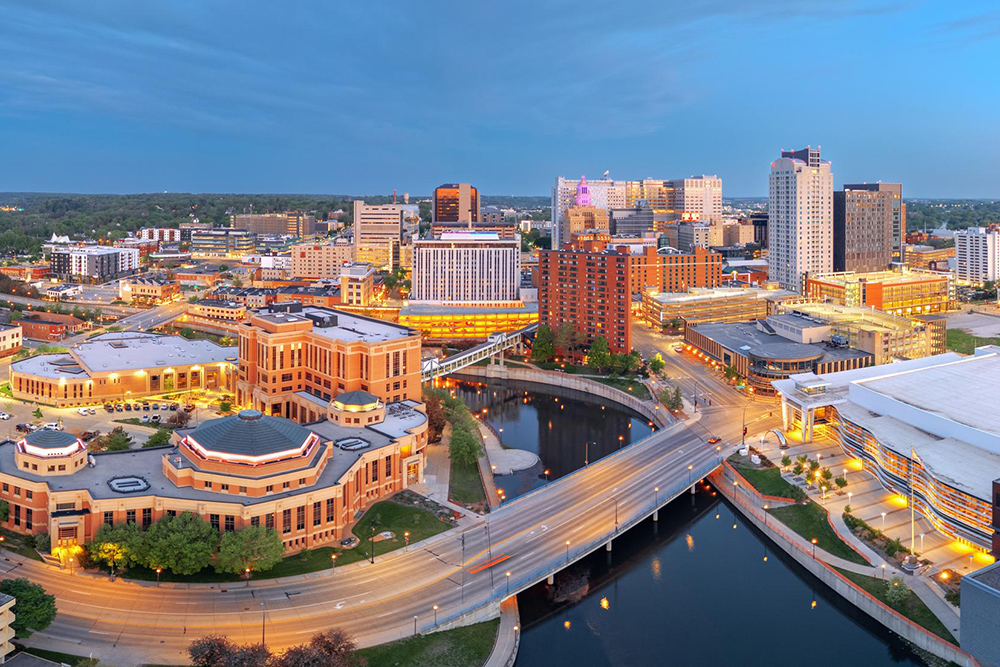
16. Rochester, MN
Coming in at No. 16 is Rochester, Minnesota, which is known nationally as home to the Mayo Clinic and that prestige carries over into our rankings. Rochester scored No. 1 of the top 25 in health care and facilities, with a staggering 338 doctors per 10,000 residents — far above any other city on the list. Last year, Rochester was rated No. 2 of our 25 top cities for Veterans and many of its benefits have stayed the same.
The area offers clean air (median AQI of 41), modest population density and strong health infrastructure. Though Minnesota only offers partial tax exemptions on retirement pay and property taxes, Rochester remains a standout for medical access. It scored No. 19 in financial well-being and No. 22 in infrastructure and quality of life, so some Veterans may find the cost more limited.
Rochester combines small-city charm with world-class health care. Home to the Mayo Clinic, one of the nation’s top medical institutions, the city attracts health professionals and patients from around the world. Veterans benefit from this infrastructure through the nearby Rochester VA Clinic and extensive specialty care options.
The city is abundant with parks and a thriving local arts scene that includes public art installations, music festivals and a year-round farmers market. With a focus on innovation and wellness, Rochester appeals to Veterans seeking long-term health access and a calm, well-organized place to live.
Still, for Veterans with medical priorities or chronic health needs, Rochester is an exceptional place to plant roots.
Rochester started as a farm community, so it’s fairly flat here. There’s a lot of biking and some water areas. You may have to travel a little, but the Mississippi River is about 45 minutes away. Lake Zumbro is about 25 minutes away and is the closest large body of water that people visit to boat, kayak, enjoy water sports, campgrounds and restaurants.”
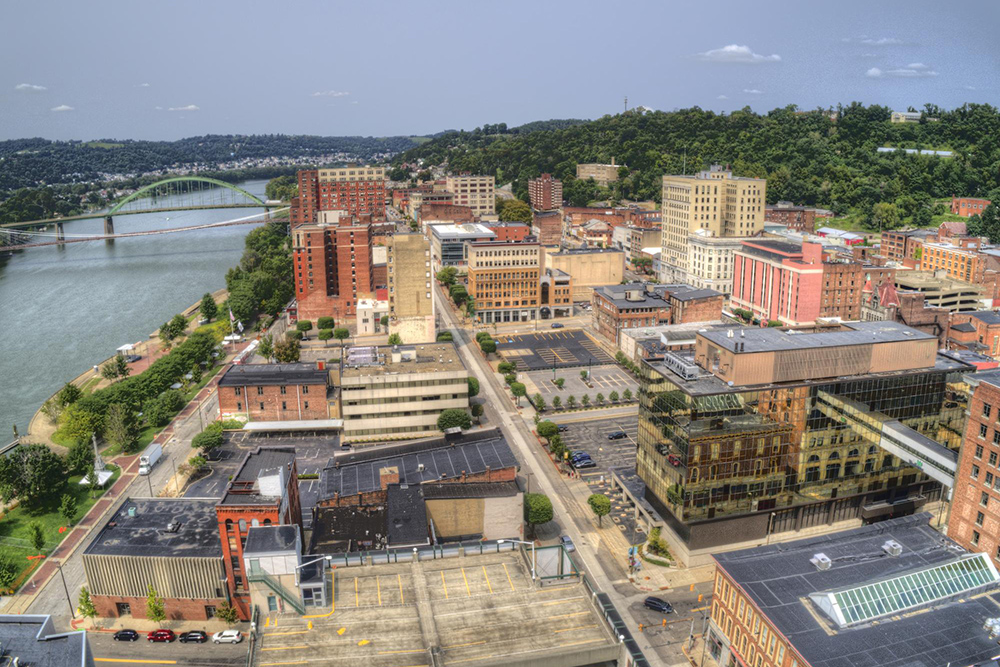
17. Wheeling, WV-OH
At No. 17 is the Wheeling, West Virginia-Ohio metro. This small Appalachian city offers quiet living with great air quality at a median AQI of 36.7, placing it at No. 5 out of 25 for air quality.
Wheeling ranked second in financial well-being, thanks to a favorable cost of living and West Virginia’s full tax exemptions for both military retirement pay and disabled Veterans’ property taxes. Plus, it has plenty of places for entertainment, with 25 venues per 10,000 people.
The city offers scenic Appalachian beauty alongside a deep sense of history and community. Veterans can access care through the Wheeling VA Community-Based Outpatient Clinic, and local organizations regularly host outreach events to support former service members.
Wheeling is nestled along the Ohio River and is home to Heritage Port Park, a popular gathering space for concerts and festivals. Families appreciate the area's low cost of living, walkable downtown and proximity to Oglebay Park, a 1,700-acre resort with hiking trails, golf and a zoo. Wheeling provides a quiet, affordable setting without sacrificing charm or connection.
While its community support (No. 15) and health care access (No. 12) scored closer to the middle, Wheeling remains an affordable choice with adequate medical support and local resources. If you’re looking for a peaceful, low-cost area with reliable Veteran tax policies, Wheeling is well worth exploring.
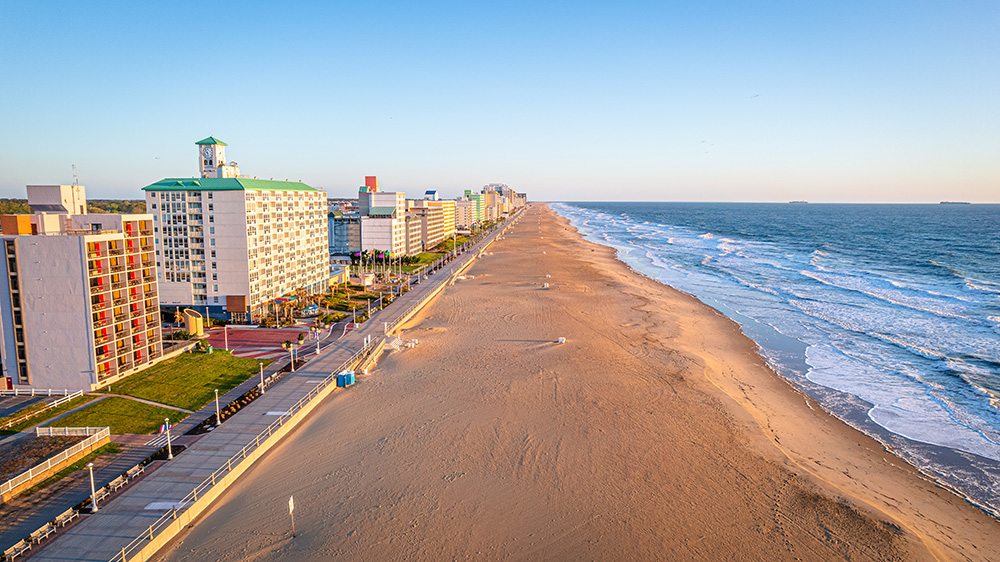
18. Virginia Beach-Chesapeake-Norfolk, VA-NC
Ranked No. 18, the Virginia Beach-Chesapeake-Norfolk metro area is a natural draw for Veterans, with a strong military presence and one of the highest Veteran concentrations in the country and a strong appeal for Veterans.
This MSA ranked third in community support among the top 25, and Veterans benefit from full property tax exemptions and partially exempt military retirement pay in Virginia. While it scored lower in healthcare access (No. 23) and financial well-being (No. 17), the area’s waterfront lifestyle, proximity to military installations and over 24 entertainment and dining venues per 10,000 people provide a lifestyle that many Veterans value
With multiple VA medical facilities and nearby Naval Station Norfolk, Veterans have consistent access to resources and services. The area also offers more than 200 miles of shoreline, including popular destinations like Virginia Beach and First Landing State Park.
The region features a strong public school system and vibrant arts scene, including the Virginia Museum of Contemporary Art and the Chrysler Museum.
If you’re looking for a large, established Veteran community with rich military roots and beachside living, Hampton Roads may be the place to land.
What makes Virginia Beach, and the Hampton Roads area in general, a great place to live is that there’s something for everyone. If you’re into history, we have it in abundance, including military history. There’s always something to explore, like Jamestown, Yorktown, Colonial Williamsburg, Wisconsin at Nauticus and so much more.
We also have water in almost every direction. Some of the local popular things to do are kayaking, sailing and surfing, as well as family favorites like dolphin and whale watching tours. The Oceanfront and the Chesapeake Bay are popular destinations for beach days and often filled with festivals and live music.”
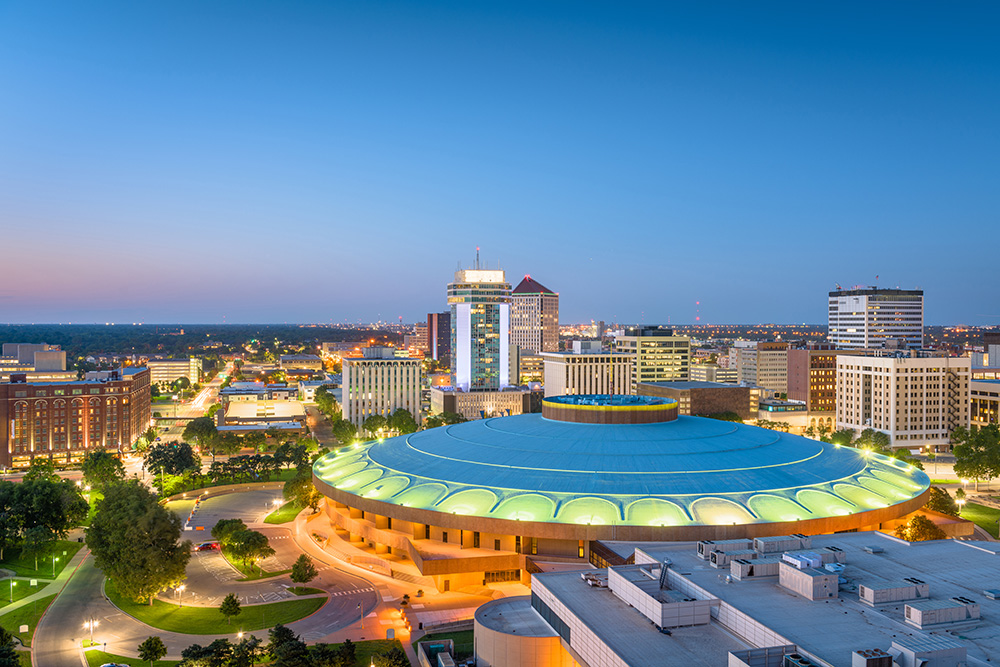
19. Wichita, KS
Wichita, Kansas comes in at No. 19, offering a blend of midwestern charm and affordability. This metro area ranked eighth for financial well-being and offers partial tax exemptions for both retirement income and property taxes for Veterans with a disability.
Wichita performed best in infrastructure and accessibility (No. 11), with 22 entertainment venues per 10,000 people and over 15 doctors per 10,000 residents. Community support ranked in the middle (No. 14), while healthcare access placed at No. 15. The city also has a relatively high Veteran count, which contributes to a steady availability of resources and services.
Wichita is Kansas’ largest city, but it still offers a friendly, small-town feel. Veterans can access care through the Robert J. Dole VA Medical Center, and the city has a network of active support groups and local organizations.
The city’s economy is bolstered by the aviation and manufacturing sectors, creating job opportunities for those transitioning to civilian life. The city also features more than 140 parks, several minor league sports teams and family attractions like Botanica Wichita and the Sedgwick County Zoo. With a stable housing market and a low cost of living, Wichita offers an easygoing lifestyle with strong community ties.
If you're seeking a cost-conscious home with accessible amenities and reliable services, Wichita might be a good fit.
Wichita offers all the perks of a big city without the congestion and stress. It has a great family community, and the locals also show great support for the military. Wichita offers affordable living and is home to many aircraft manufacturers which offer great jobs.”
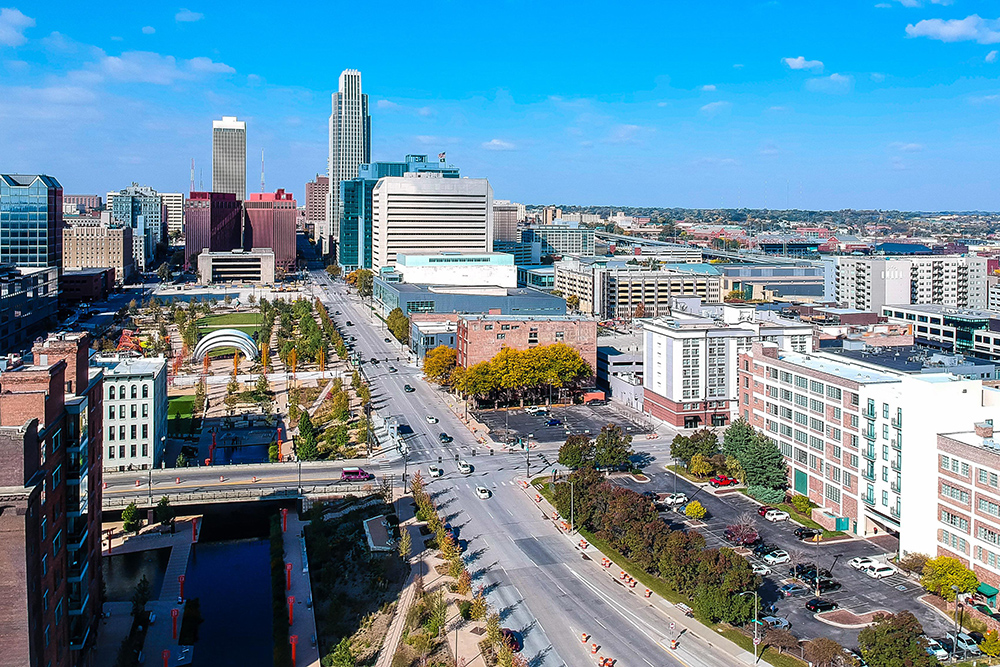
20. Omaha, NE-IA
At No. 20 is the Omaha-Council Bluffs metro spanning Nebraska and Iowa. Known for its steady economy and expansive park system, Omaha ranked eighth of the top 25 in quality of life and infrastructure and fourth for air quality with a median AQI of 36.
The region also has a high Veteran count, with over 58,000 Veterans and a Veteran per capita rate of 59.7 per 1,000 residents. Veterans with a 100% disability rating in Nebraska may qualify for a property tax exemption.
Omaha offers a blend of urban convenience and Midwestern hospitality. Veterans benefit from the Omaha VA Medical Center and support services through Offutt Air Force Base, located just south of the city.
The city is known for its extensive park system, thriving food scene and historic neighborhoods like the Old Market, where cobblestone streets are lined with shops, restaurants and galleries. Families enjoy attractions like the Henry Doorly Zoo and Aquarium, one of the top-rated zoos in the world.
For Veterans seeking urban convenience with solid infrastructure and a growing support base, Omaha has a lot to offer.
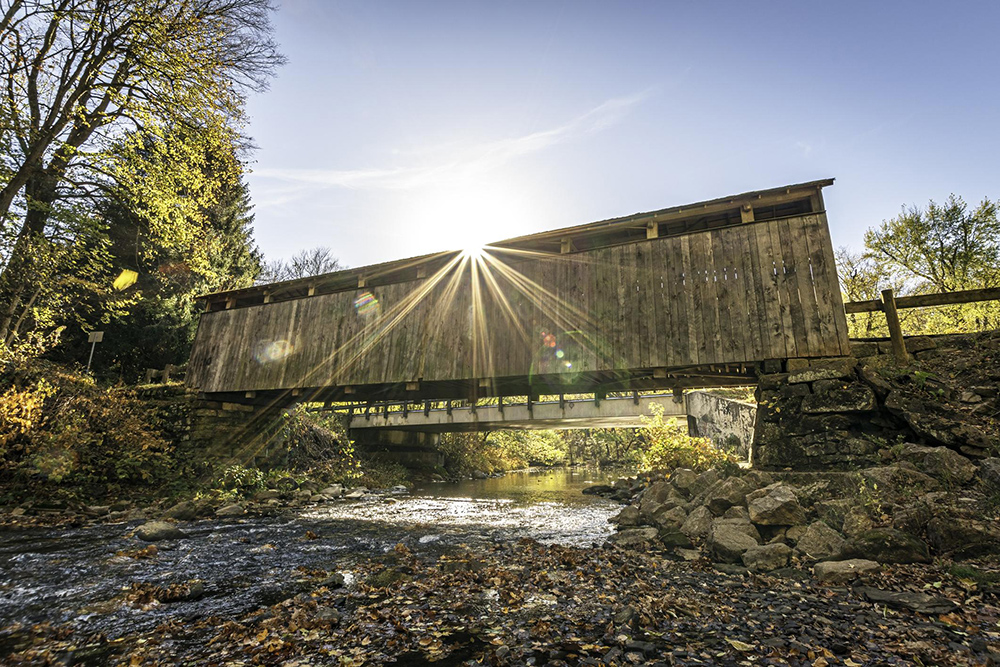
21. Salem, OH
Salem, Ohio, takes the No. 21 spot on our list. This city offers a small-town environment with a relatively high Veteran density, ranking in the top third of our list of 25 for per capita Veteran populations.
Most notably, Salem had the best air quality scores among the top 25 with a median AQI of 12, and it had the second highest score for driveability to VA health facilities, with nearby facilities in Cleveland, Akron, Youngstown and Canton.
The city ranked 10th in community support and eighth in healthcare access, with a favorable cost of living and one of the top five scores for median home affordability among the top 25. These factors also helped it earn the No. 10 spot in financial well-being. While Ohio fully exempts military retirement pay, the MSA ranked slightly lower in infrastructure, landing at No. 19.
The city’s historic downtown features 19th-century architecture, independent shops and a growing arts community. Families can enjoy nearby parks and lakes, as well as events like the Salem Super Cruise and annual summer festivals.
If affordability and a tight-knit Veteran presence matter more to you than big-city amenities, Salem could be a comfortable fit.
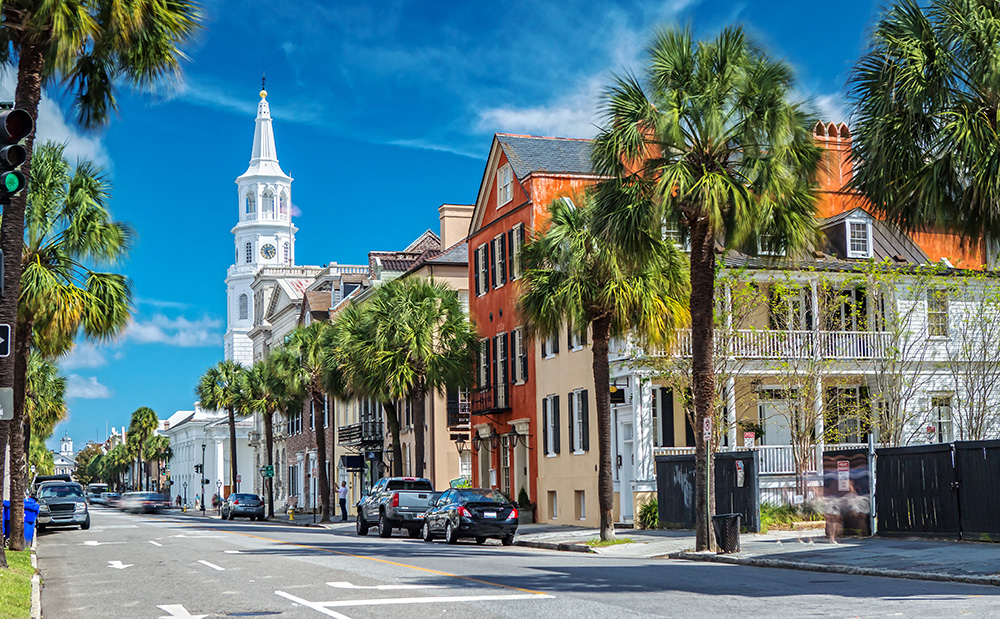
22. Charleston-North Charleston, SC
Ranked No. 22 is the Charleston-North Charleston metro, a scenic and historically rich area that continues to draw new residents. Veterans make up a significant share of the population here — 78.5 per 1,000 residents, the fourth highest among the top 25. The metro also ranks well for air quality and the number of doctors per capita.
Charleston performed well in infrastructure (No. 6) and community support (No. 8). However, it ranked the lowest of the top 25 for financial well-being. Still, South Carolina’s full tax exemptions for military retirement pay and potential property tax relief for Veterans with a disability help offset this disadvantage.
Veterans are supported by a strong military presence, including Joint Base Charleston and the Ralph H. Johnson VA Medical Center. The area is rich in American history, from Revolutionary War sites to preserved antebellum architecture.
Its historic downtown is known for cobblestone streets, seafood restaurants and the Charleston City Market. The metro’s beaches, boating opportunities and growing tech and healthcare sectors offer a high quality of life for a variety of lifestyles.
If you value culture, coastal living and a well-established Veteran network — and can manage a slightly higher cost of living — Charleston offers a strong sense of place.
Charleston is a unicorn – it is different from everywhere else. It’s beautiful and historic. There are lots of outdoor activities, including beaches and golf courses, and it's affordable.
The city offers preowned homes where you can feel the vibe and new construction options where you don’t have to drop $1 million. There’s also a good restaurant scene, there’s always something new popping up.”
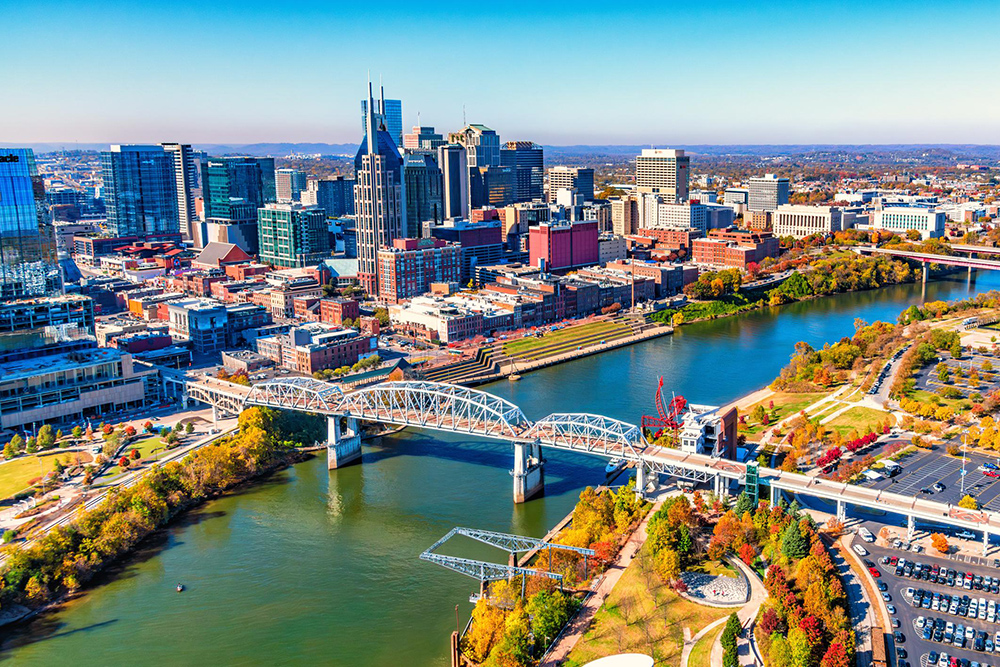
23. Nashville-Davidson-Murfreesboro-Franklin, TN
At No. 23 is the Nashville metro area, which also encompasses Davidson, Murfreesboro and Franklin, Tennessee. Known for its vibrant music scene and booming job market, this MSA offers cultural richness and access to amenities but at a higher cost.
Nashville has over 95,000 Veterans, though its per capita Veteran population is lower than many other cities in the top 25. Of the top 25, it ranked No. 7 for healthcare and facilities, thanks in part to its strong physician density (105.1 doctors per 10,000 people) and quality health care institutions and No. 10 for infrastructure/accessibility/quality of life. The metro had the fifth-best number of entertainment, food and drink venues per capita, at 28.8 per 10,000 people. Financial well-being, however, landed at No. 22, and community support scores were also mid-range.
Veterans have access to the Nashville VA Medical Center and additional resources through Fort Campbell, about an hour away. The area is home to major universities, professional sports teams and a thriving food and nightlife scene.
Neighborhoods like Franklin and Murfreesboro offer suburban comfort with quick access to downtown. Nashville’s central location, airport connectivity and career opportunities make it a good fit for Veterans transitioning into civilian life or raising a family in an energetic city.
For those drawn to a larger metro with exceptional hospitals and a thriving urban culture, Nashville could be a good fit, especially if the cost of living isn't a top concern.
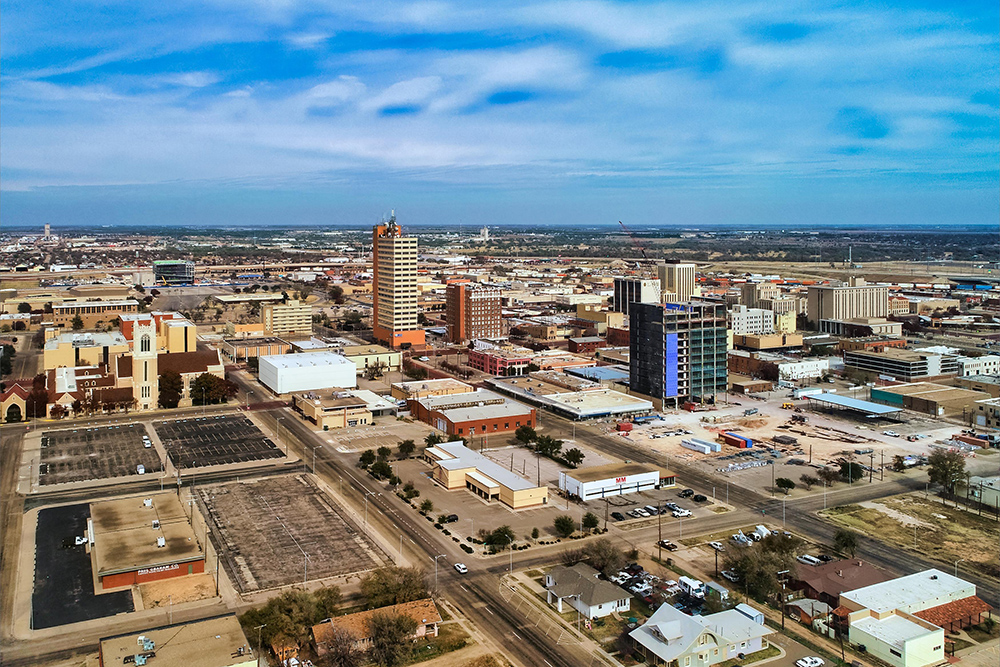
24. Lubbock, TX
Coming in at No. 24 is Lubbock, Texas, a city in the state’s northwest known for its wide-open spaces and growing university influence. Lubbock scored No. 6 in financial well-being, driven by low costs of living and favorable Veteran tax policies — Texas offers a full exemption on retirement pay and may fully exempt property taxes for 100% disabled Veterans. Even better, the city was the third best of the top 25 for infrastructure, accessibility and quality of life.
Despite these strengths, Lubbock ranked 25th in community support, likely due to a smaller and less dense Veteran population (40.7 per 1,000 residents) compared to other cities in the top 25. Its healthcare and facilities access score was also low (No. 22). However, don’t let a low Veteran population hold you back: Lubbock saw a 6.96% increase in the Veteran population year over year.
Veterans in the area are served by the Lubbock VA Clinic, and the city’s steady growth means expanding access to services and amenities. Home to Texas Tech University, Lubbock supports a diverse and youthful energy, with college athletics, music venues and cultural festivals throughout the year. Residents can also enjoy access to local wineries and nearby state parks.
Veterans looking for a low-cost Texas city with tax advantages and room to grow might find Lubbock an appealing option.
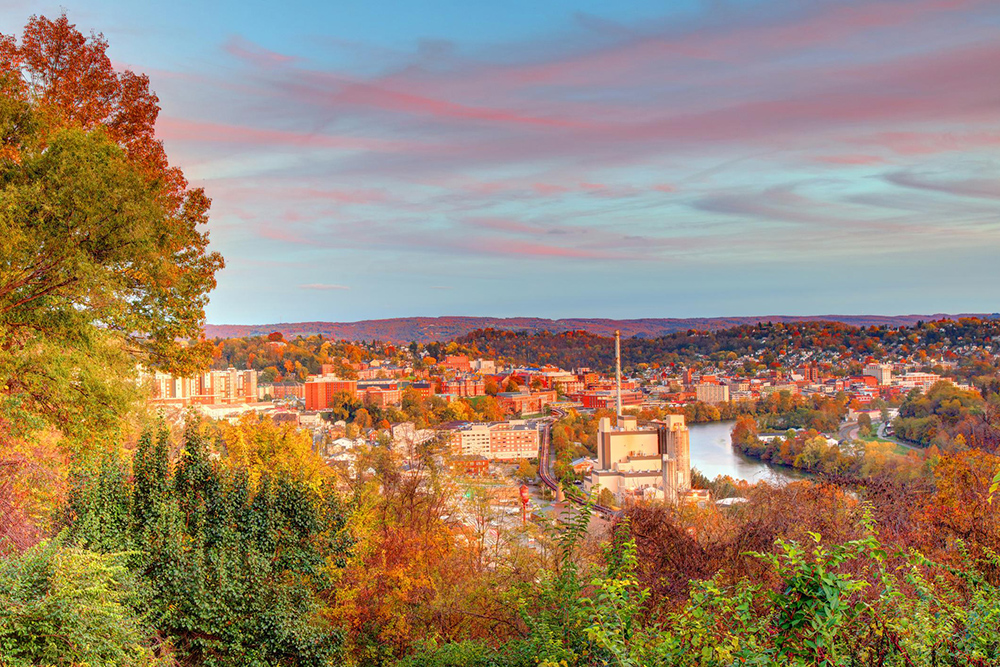
25. Morgantown, WV
Rounding out the list at No. 25 is Morgantown, West Virginia — a small college town that offers impressive strengths in health care and affordability. Morgantown ranked third of 25 in healthcare and facilities, with a remarkable 165.9 doctors per 10,000 residents — one of the highest physician densities in our entire ranking. This is due to top employers in the area including WVU Medicine, Monongalia General Hospital, the CAMC Health System and more.
The city also scored No. 4 in financial well-being, largely due to its place as the top 25’s second-best city for cost of living. Morgantown’s challenges came in the form of lower infrastructure (No. 24) and modest community support (No. 22).
Veterans benefit from the Morgantown VA Clinic and additional resources through West Virginia’s statewide Veteran services network.
Set in the Appalachian Mountains, Morgantown offers four seasons of outdoor activity, from hiking in Coopers Rock State Forest to skiing in nearby resorts. The city also features a lively downtown with bookstores, coffee shops and live music venues. Morgantown’s balance of affordability, medical access and mountain charm makes it a distinctive option for Veterans looking for both peace and connection.
For Veterans seeking access to top-tier medical care in a more rural and affordable setting, Morgantown offers a unique value.
Best Small Cities for Veterans to Live
Our Best Small Cities for Veterans list was curated from the cities that were smaller than our top 100 MSAs by population. This includes a mix of medium-sized metros as well as our smallest micropolitan areas. For Veterans who want to plant roots in a smaller community, we recommend the nearby towns outside of the primary city limit.

1. Battle Creek, MI
Topping our Best Small Cities for Veterans list is Battle Creek, Michigan. Located in southern Michigan, Battle Creek blends affordability, access and a strong support network. Of the top ten small cities, Battle Creek ranked No. 1 for community support and No. 5 in financial well-being, giving it a strong all-around profile.
Battle Creek also performed well in health care, ranking No. 4 in healthcare and facilities, with one of the highest rates of VA benefits facilities per 10,000 Veterans. The area also ranked in the top six for air quality and cost of living, with favorable tax policies that include full exemptions for both military retirement pay and disabled Veteran property taxes.
If you're seeking a well-rounded, affordable small city with a tight-knit Veteran community, Battle Creek delivers.
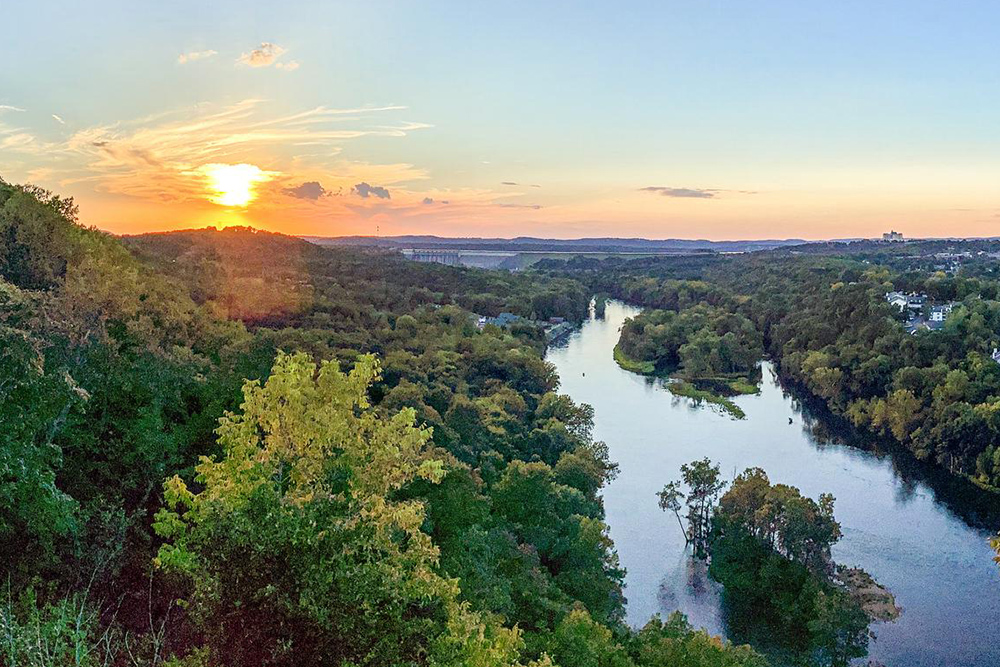
2. Branson, MO
Coming in at No. 2 is Branson, Missouri, a small city with an outsized personality. Known for its live music, scenic Ozark setting and family-friendly attractions, Branson also scored reasonably well for cost of living, for a city with a high entertainment-to-person ratio.
Branson performed strongly across infrastructure, health care and community categories, with a small city ranking of third in infrastructure and quality of life and No. 4 in community support. Its quality of life score stands out due to the high number of entertainment venues, bars and restaurants per capita, with 53 venues per 10,000 people — the fourth-highest of all evaluated cities.
While the Veteran population is smaller, it’s steady. Missouri also provides full property and retirement tax exemptions for eligible Veterans.
If you're looking for a small-town feel with tourist-town energy and Veteran-friendly finances, Branson is a standout.
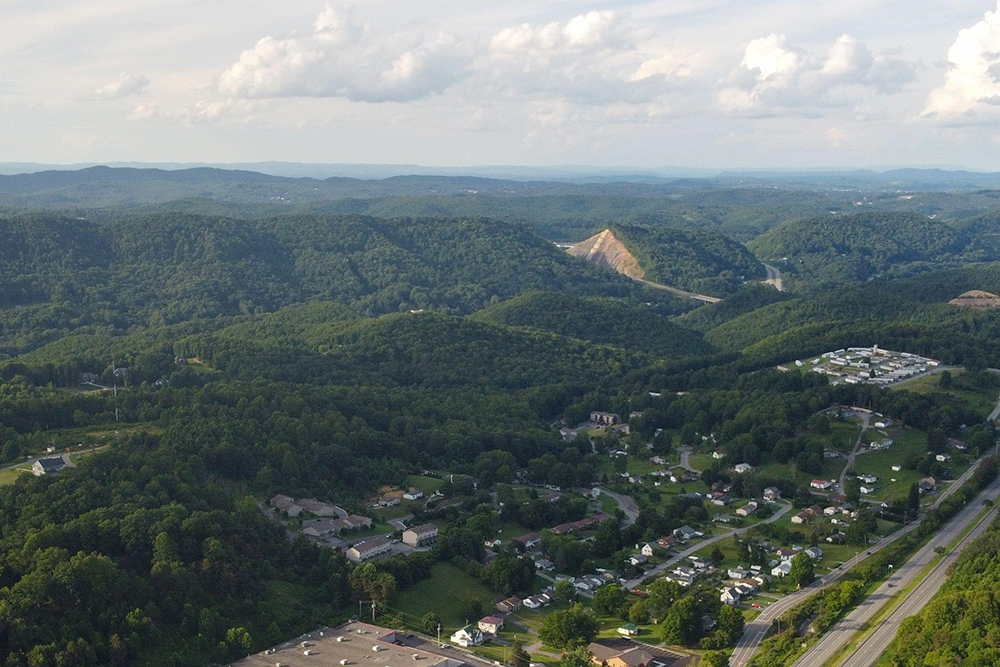
3. Bluefield, WV-VA
Bluefield, located along the border of West Virginia and Virginia, offers a quiet, affordable option for Veterans looking to settle in a smaller community. The area is home to 5,519 Veterans, making up about 5.6% of the population.
The median air quality index (AQI) sits at 38.4, indicating cleaner air than many other cities on the list. While the Veteran population declined by nearly 10% year over year, access to services remains notable: the area supports general health care access with 15.1 hospital physicians per 10,000 people.
For daily life, Veterans in Bluefield can access 18.9 entertainment and food venues per 10,000 residents. The median listing price is listed as $189,450, keeping housing relatively accessible, and the metro sported the third best cost of living across the top small cities.
Bluefield offers solid value for Veterans prioritizing clean air, affordability and access to essential services in a peaceful setting.

4. Sioux Falls, SD-MN
Sioux Falls ranks No. 4 on our list, combining small-city comfort with large-city medical access. Of our small cities, it placed second in healthcare and facilities and fifth in infrastructure and quality of life, making it an excellent choice for Veterans focused on care and everyday accessibility.
While its financial well-being rank was slightly lower (No. 8), South Dakota still offers solid tax benefits, with partial exemptions for disabled Veterans and full exemptions on military retirement income. The city also has a solid Veteran presence, with roughly 50 Veterans per 1,000 people.
Veterans seeking medical access, nature and reliable amenities will find a lot to like in Sioux Falls.
The state of South Dakota is extremely Veteran-friendly. In addition to the typical organizations (VA, VFW, American Legion), there are a number of volunteer, grassroots organizations that support Veterans. One of the organizations – The Wings of Valor Lodge – is a commercial world-class pheasant hunting hunting lodge that offers Veterans from across the country, all-expense paid trips. The lodge serves as a gathering place to motivate and empower Veterans and active service members in the outdoors. Other states are trying to emulate what the state has done to support Veterans.”

5. Myrtle Beach-Conway-North Myrtle Beach, SC
Though Myrtle Beach earned the top spot on our overall list, it did not perform quite as well in the small city category. Still, Myrtle Beach-Conway-North Myrtle Beach has earned a top-five spot on our small cities list.
Myrtle Beach ranked second in community support out of our top ten small cities, and it also landed No. 2 for infrastructure and quality of life, driven by a solid Veteran presence and access to recreation and public services. South Carolina provides full tax exemptions for both military retirement and disabled Veteran property taxes to eligible Veterans, enhancing its financial appeal.
For Veterans who want ocean access, a supportive community and a lower-tax lifestyle, Myrtle Beach remains a top-tier small city.

6. Decatur, IL
Decatur, Illinois stands out for its affordability and overall financial strength among this year’s top 10 small cities. The city offers one of the lowest median home listing prices in the group, sitting at $142,500, and maintains a favorable cost of living profile that supports its No. 1 showing in financial well-being for the small cities.
Veterans make up just over 5.4% of the population with 5,623 Veterans living in the metro. The city also scored decently for air quality with a median index of 43.
With strong financial footing and a wide range of local services, Decatur offers Veterans an appealing blend of affordability, infrastructure and community stability.
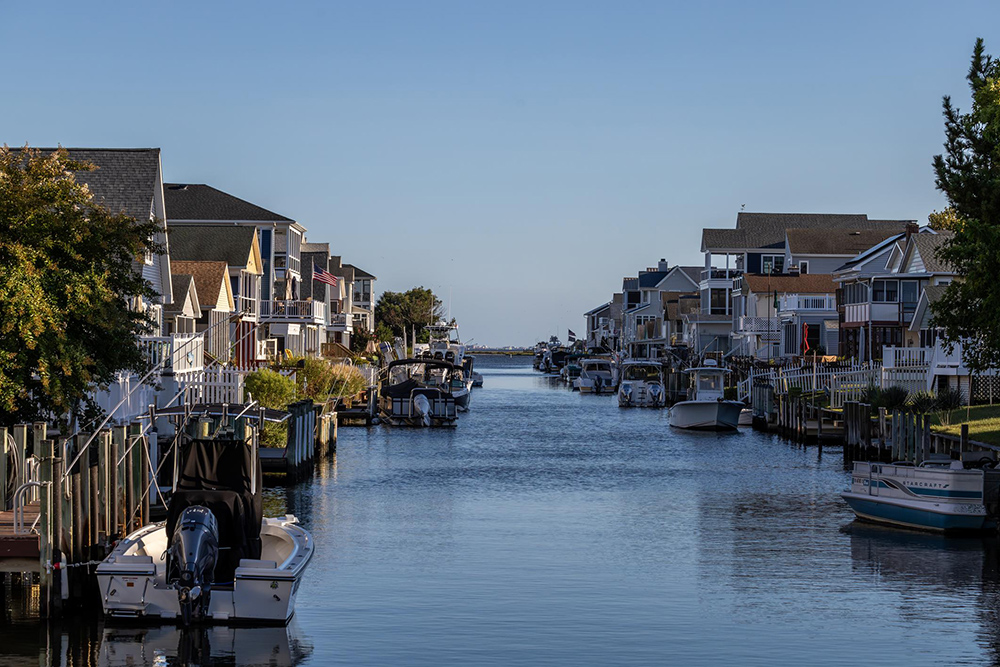
7. Ocean Pines, MD
Ocean Pines, Maryland distinguishes itself among the top 10 with some of the strongest access to food and entertainment venues. Though it’s an especially small area, the metro has the highest concentration of restaurants and entertainment options per capita of all of our evaluated cities, contributing to a high quality-of-life experience for Veterans who value access to amenities in a particularly small community.
The Veteran population here makes up more than 8% of the total, the highest share among the top 10, and the area benefits from solid air quality and driving proximity to a military base. Access to VA facilities is also strong relative to its size.
While housing costs are higher than others in this group, Ocean Pines’ mix of livability, service access and community density makes it a standout option for Veterans seeking a small-town setting with big-time convenience.

8. Rochester, MN
Coming in at No. 8 is Rochester, Minnesota — known as home to the Mayo Clinic and a national hub for health care. Unsurprisingly, Rochester ranks No. 1 in healthcare and facilities access among small cities and boasts an incredibly high concentration of medical professionals (338.5 per 10,000 people citywide).
Despite a lower score in financial well-being, Rochester’s strong health infrastructure and stable environment make it an ideal option for Veterans with ongoing medical needs. Although community support ranked lower, the city's resources may outweigh that factor for many.
If you're a Veteran prioritizing top-tier healthcare, a calm environment and proximity to one of the world’s leading medical institutions, Rochester delivers a standout blend of stability and support.
Rochester has been, over the years, rated one of the top communities in the country for quality of life. It’s Minnesota, but we have months of nice summer weather and don’t always have bitter winters. There’s lots of access to outside activities, kayaking, biking, fishing, and boating that is in abundance here. It is the land of 10,000 lakes. Rochester also has world-class medical care access. The Mayo Clinic has a plan to develop facilities and they are trying to be forward-thinking. There’s significant growth planned for the area in the future."
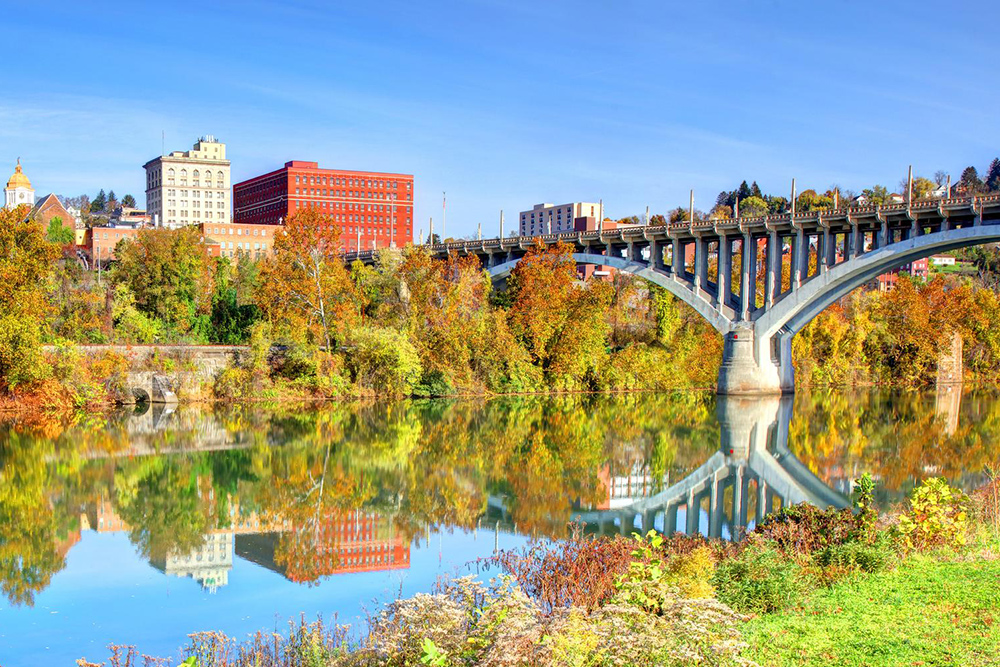
9. Fairmont, WV
Fairmont, West Virginia earns its place in the top 10 with strong rankings in affordability, air quality and Veteran service access. It ranks second for air quality amongst the top ten, making it one of the cleanest environments in the group.
The city also places third for healthcare and facilities and third for financial well-being, indicating that essential services and affordability are well-aligned here. Though its infrastructure and lifestyle options are more modest compared to some peers, ranking eighth of the top ten for that category.
If you're a Veteran looking for clean air, low cost of living and dependable access to care in a quiet, compact setting, Fairmont offers a compelling package.
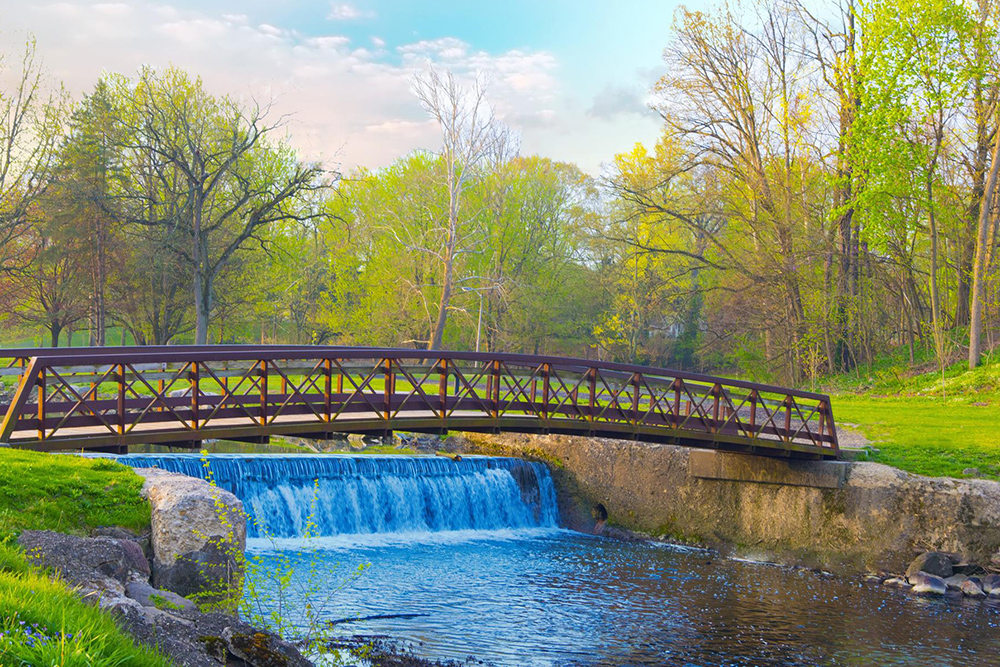
10. Kokomo, IN
Rounding out the top 10 is Kokomo, Indiana, a small city with a strong financial foundation and relatively affordable real estate, with median home prices sitting at $178,250. Kokomo ranked No. 2 in financial well-being amongst the top small cities and placed in the top half for community support.
Veterans make up about 6.4% of the local population, and the city has moderate access to VA services. Kokomo offers a reliable range of entertainment and dining options, with over 25 venues per 10,000 residents.
With the nearby Grissom Air Reserve base and well-rounded support for Veterans, Kokomo stands out as a practical choice for those seeking stability, convenience and access in a manageable, small-city environment.
Best Big Cities for Veterans to Live
To filter our results for the best big cities for Veterans, we evaluated the top 100 MSAs by population, which includes all MSAs with a population of 565,000 or greater.

1. Charleston-North Charleston, SC
Charleston-North Charleston leads this year’s list of Best Big Cities for Veterans by offering strong across-the-board performance in Veteran support, lifestyle quality and access to care.
Among the top 10, Charleston ranks second in infrastructure, accessibility and quality of life, fourth in healthcare/facilities and fourth in community support.
It also boasts the second-highest Veteran population share in the top 10, with Veterans making up nearly 7.9% of local residents. The area has over 2,800 hospital physicians, along with good access to entertainment and dining, totaling more than 2,100 venues.
While it ranks lower for housing affordability, with a median listing price just under $500,000, the city balances this with proximity to Joint Base Charleston, favorable state tax exemptions on property for disabled Veterans and an exemption on military retirement pay.
Charleston’s combination of lifestyle perks, service access and a growing Veteran community make it a compelling choice for Veterans seeking coastal living with real support behind it.
Charleston is on the water, so summers are hot and humid, but there are lots of pools and palm trees.
Goose Creek (a city about 30 minutes from Charleston) is home to the Naval Nuclear Power Training Command and the Naval Weapons Station. It offers a sparse suburban feel and good schools. Veterans and military personnel like Goose Creek because it is close to the Naval base, and the maritime forest offers outdoor activities.”

2. Las Vegas-Henderson-North Las Vegas, NV
Las Vegas-Henderson-North Las Vegas secures the second spot on this year’s list with a compelling mix of access, entertainment and healthcare support for Veterans.
Among the top 10 biggest cities, the Las Vegas metro ranks second in healthcare and facilities, third in infrastructure, accessibility and quality of life and sixth in community support. Veterans make up just over 6% of the population, and while VA-specific facility density is lower than in some peers, the area is anchored by proximity to Nellis Air Force Base, which expands access to services for eligible Veterans.
Las Vegas offers more than 28 entertainment/restaurant/bar venues per 10,000 people, beating out every other city in the top 10. Housing affordability is a challenge, with a median listing price just under $470,000, but Nevada helps offset that with a full exemption on military retirement pay and partial exemptions for disabled Veterans on property taxes.
With an active lifestyle scene and access to a nearby military installation, Las Vegas offers a unique blend of services and energy for Veterans seeking something dynamic.

3. Orlando-Kissimmee-Sanford, FL
Orlando-Kissimmee-Sanford takes the third spot among the best big cities for Veterans, driven by its exceptional livability and favorable state tax benefits.
Among the top 10, Orlando ranks first in infrastructure, accessibility and quality of life, reflecting the region’s strong public amenities. Florida’s full exemptions on both military retirement pay and property taxes for eligible disabled Veterans further boost the city’s appeal, helping it land sixth in financial well-being.
Though Orlando ranks lower for healthcare and community support (both tenth in the top 10), it benefits from proximity to multiple military bases and a strong general healthcare presence, with more than 2,000 hospital physicians in the area. Veterans make up just over 5% of the population, and the city is home to 6,900 entertainment and food venues, offering no shortage of things to do. Air quality is also a highlight, with a median AQI of 42, among the best in the top 10, especially for a big city.
Veterans looking for a vibrant, sunny metro with excellent amenities and Veteran-friendly tax policies will find Orlando to be a strong fit.

4. Cleveland, OH
Cleveland earns its spot at No. 4 thanks to exceptional healthcare access and affordability, making it one of the most practical and service-rich metros for Veterans.
Among the top 10, Cleveland ranks first in healthcare and facilities and first in financial well-being, reflecting the city’s combination of excellent medical infrastructure and cost-effective living for a big city. With more than 7,100 hospital physicians and over 5,000 entertainment and food venues, Cleveland supports both quality care and a vibrant lifestyle.
Veterans make up just over 5% of the population, and the area benefits from a median home listing price of $249,000, one of the lowest in the top 10. Cleveland ranks lower amongst the big cities in community support (ninth) but maintains a strong overall infrastructure profile and proximity to a military base.
Veterans who prioritize affordability and access to premier healthcare services will find Cleveland a highly attractive option.

5. Tampa-St. Petersburg-Clearwater, FL
Tampa-St. Petersburg-Clearwater offers a compelling blend of Veteran population density, healthcare access and quality-of-life infrastructure, securing the No. 5 spot in this year’s big city rankings.
Among the top 10, Tampa ranks fourth in infrastructure, accessibility and quality of life, and fifth in healthcare and facilities. The region offers over 7,100 entertainment and food venues, along with a physician network of more than 800 hospital doctors.
Florida supports Veterans with some of the most favorable tax policies in the country, offering full exemptions for both military retirement pay and property taxes for eligible 100% disabled Veterans. While Tampa ranks in the middle of the pack for financial well-being and community support, its service access and coastal amenities offer significant appeal.
For Veterans seeking a sunny, service-rich metro with a large peer community and strong state-level benefits, Tampa remains a solid and consistent choice.
In Tampa, there is something for everyone. Whether a buyer is looking for a strong community, good schools, age-restricted communities, active communities, morning walks on the beach, or quieter agricultural areas - you can find it in Tampa.”
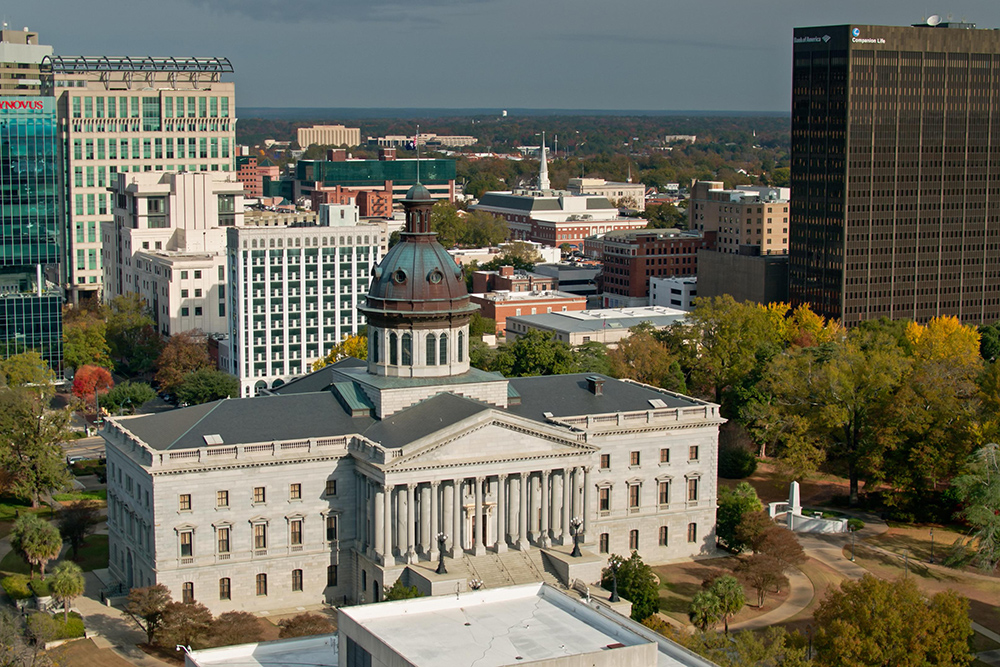
6. Columbia, SC
Columbia, South Carolina makes a strong showing in this year’s top 10 with standout performance in Veteran-focused support and affordability.
Among the top 10 big cities, Columbia ranks second in both financial well-being and community support. The city has 71.7 Veterans per 1,000 people, one of the highest proportions of the top big cities. The state also benefits from full state exemptions on both military retirement pay and property taxes for eligible 100% disabled Veterans, policies that enhance Columbia’s reputation as a tax-friendly place to settle down.
While Columbia ranks lower in infrastructure (tenth) and healthcare access (eighth), it maintains solid VA service availability, with relatively high per-capita access to offices. The area also features proximity to Fort Jackson, one of the nation’s largest military training bases.
For Veterans looking for an affordable Southern metro with a strong support network and favorable tax landscape, Columbia is a well-balanced choice.

7. Buffalo-Cheektowaga, NY
Buffalo-Cheektowaga offers Veterans a strong blend of affordability, health care access and daily livability, placing it seventh on this year’s Best Big Cities for Veterans list.
Among the top 10, Buffalo ranks fourth in financial well-being and fifth in infrastructure, accessibility and quality of life. Veterans make up just over 5% of the metro’s population, and the region provides robust health care access with more than 1,400 hospital physicians and one of the highest rates of VA health facilities per 10,000 Veterans among its peers.
The area’s median air quality index of 39.5 is among the best in the top 10, and with more than 2,900 entertainment and food venues, it offers a wide range of lifestyle options. Though community support and benefit office access rank closer to the middle of the pack, Buffalo maintains some of the best affordable housing for a bigger metro with a median listing price around $260,000, and New York provides a full exemption on military retirement pay.
Veterans looking for strong medical access, clean air and affordability in a metro with historic character will find Buffalo a well-rounded contender.
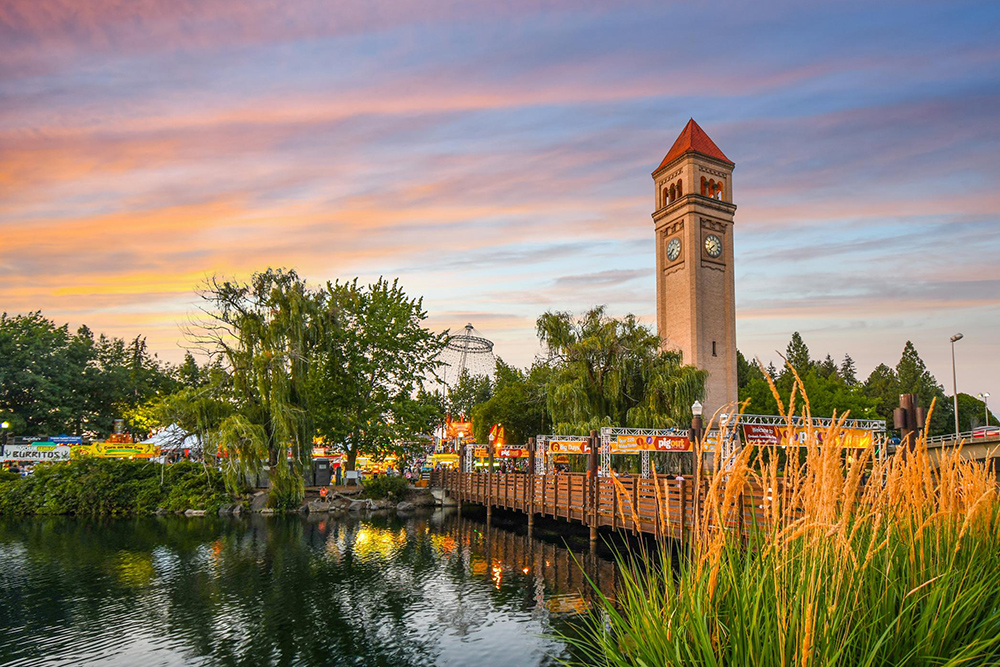
8. Spokane-Spokane Valley, WA
Spokane earns its place in the top 10 with a high Veteran population share, strong healthcare access and a clean-air environment.
Among the top 10 big cities, Spokane ranks third in healthcare and facilities, third in community support and seventh in infrastructure and quality of life. Veterans make up more than 7.7% of the population, contributing to a strong sense of Veteran presence and access to relevant resources.
The area boasts one of the lowest air quality index scores (median AQI 31.5), indicating exceptionally clean air. Spokane also offers solid access to VA care, with high per-capita availability of health facilities, in part due to the Mann-Grandstaff VA Medical Center. Though, housing is on the more expensive side with a median listing price over $500,000.
With its health-forward environment and strong Veteran community, Spokane is a smart choice for Veterans prioritizing wellness and natural beauty.

9. Virginia Beach-Chesapeake-Norfolk, VA-NC
Virginia Beach-Chesapeake-Norfolk lands at No. 9 on this year’s list, driven by its extraordinary concentration of Veterans and a long-standing military presence.
Among the top 10, this metro ranks first in community support and fifth in financial well-being. Veterans make up nearly 11% of the population, the highest share of any city in the top 10, thanks in part to the region’s deep-rooted military infrastructure. The area is home to Joint Expeditionary Base Little Creek-Fort Story and Naval Station Norfolk, which is the largest naval base in the world.
Virginia Beach offers more than 4,300 entertainment and food venues. The healthcare and infrastructure rankings are slightly lower (ninth in both), and while property taxes for eligible 100% disabled Veterans are fully exempt, the state only partially exempts military retirement income.
For Veterans who want to be surrounded by peers in a community built on service, this metro offers unmatched connection and access to one of the strongest military networks in the country.
Military pride is a part of our culture here in Virginia Beach and the Hampton Roads area. I am not sure I can truly put into words how deeply it is woven into the fabric of our community.
Let anyone know you are military and they will thank you for your service or relate to you with their own experiences. There’s also a lot of support for military family members. You have a big community here who looks out for one another.”
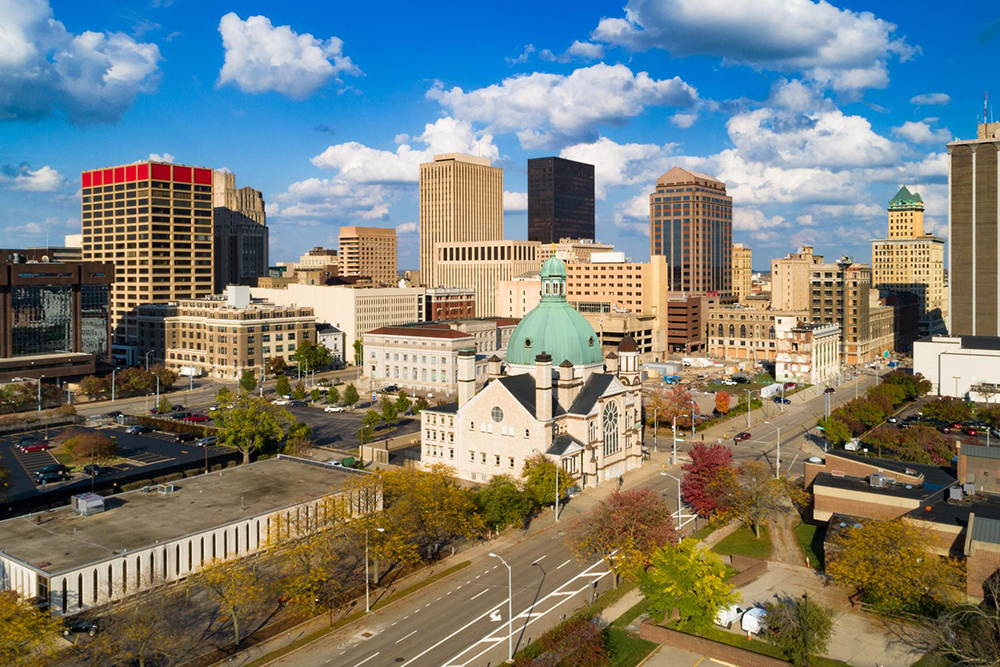
10. Dayton-Kettering-Beavercreek, OH
Dayton-Kettering-Beavercreek rounds out this year’s top 10 with strong affordability, solid access to VA services and a sizeable Veteran presence.
Within the top 10, Dayton ranks third in financial well-being, fifth in community support and sixth in healthcare and facilities. Veterans make up nearly 7% of the metro’s population, and the region offers one of the highest concentrations of driveable VA health facilities per capita among its peers. It’s also home to Wright-Patterson Air Force Base, one of the largest and most significant U.S. Air Force bases.
The city maintains a median air quality index of 45, has nearly 2,000 hospital physicians and supports a variety of lifestyle needs with more than 1,700 entertainment and dining venues. Housing is comparatively affordable for a bigger metro with a median listing price around $239,900.
Dayton offers a strong foundation for Veterans who prioritize affordability, access to healthcare and proximity to military institutions in a practical and well-connected community.

| Metropolitan Statistical Area (MSA) | Overall Rank | Financial Well-Being | Community Support | Healthcare and Facilities | Quality of Life |
|---|
Data Highlights
In all, 23 different factors went into creating our Best Cities for Veterans to Live list.
Here's a snapshot of the top five cities for some of the most important factors to Veterans.
Top Cities with Highest Veteran Population per Capita





Lowest Home Prices
- Johnstown, PA
- Pottsville, PA
- Decatur, IL
- Altoona, PA (tied)
- Flint, MI (tied)
Most Healthcare Resources per Capita
- Rochester, MN
- Lawrence, KS
- Ann Arbor, MI
- Morgantown, WV
- Whitewater-Elkhorn, WI
Lowest Cost of Living
- Decatur, IL
- Brownsville-Harlingen, TX
- McAllen-Edinburg-Mission, TX
- Tupelo, MS
- Niles, MI
Most Entertainment and Food Venues per Capita
- Barnstable Town, MA
- Bozeman, MT
- Atlantic City-Hammonton, NJ
- Sandusky, OH
- Los Angeles-Long Beach-Anaheim, CA
Best States for Veterans

To help formulate the Best States for Veterans list, we asked 599 Veterans to rate the importance of factors that they consider when determining where to live. The states that ranked highest on our list averaged high scores for factors that the surveyed Veterans considered especially important, like median air quality, average cost of living, number of VA facilities and support for homeless Veterans.
We also considered statewide policies, such as whether the states taxed military retirement income and what (if any) property tax exemptions for Veterans with disabilities were offered.
Due to these factors and policies, most of our top states were located in the Midwest and Southern regions of the United States.
Methodology
To score the best cities for Veterans to live, our team of 8 experts spent collectively 180 hours reviewing 23 variables across 14 external data sources. These variables span four categories of interest:
- Financial well-being
- Community support
- Healthcare and facilities
- Infrastructure, accessibility, and quality of life
To better inform our variable and categorical importance, we surveyed 599 Veterans across ages 18 to 60+. Gen Z (18-27) made up 23.1% of the survey, Millennials (28-43) were 42.3%, Gen X (44-59) was 19.3% and all older generations (60+) made up 15.3% of the survey.
The Veteran survey respondents were asked to rate the importance of our 23 variables as “Very Important,” “Somewhat Important” and “Not Important.” The scores for each variable were normalized and then multiplied by a weight corresponding to our Veteran survey input.
Check out how Veterans responded to the variables influencing their ideal home location below:
Community Support
 Weights include:
Weights include:
- Homeless Veteran population
- Veteran population growth
- Veteran population
- Disabled Veteran population
- Higher education grants, scholarships, or programs available for Veterans
- Number of military bases in-state
Financial Well-Being
 Weights include:
Weights include:
- Cost of living
- Median home listing price
- Price of gas
- Property tax exemptions for service-related disabilities
- How military retirement income is taxed
- Employment rate
Infrastructure, Accessibility, Quality of Life
 Weights include:
Weights include:
- Median air quality
- Access to fresh food/grocery stores
- Clean living/energy consumption
- Quality of the education system
- Government support for transportation infrastructure
- Proximity to major airports
- Number of entertainment/food/drink venues per capita
Healthcare and Facilities
 Weights include:
Weights include:
- VA health facilities
- VA benefits facilities
- Quality of health facilities
- Number of physicians
Variables were normalized and then multiplied by the appropriate weight. Each variable score for a city was added to achieve a composite score reflecting the city’s overall performance.
We scored 605 Core Based Statistical Areas (CBSAs) that include both Metropolitan Statistical Areas (MSAs) as well as Micropolitan Statistical Areas (μSAs) in order to capture different Veterans’ needs for large cities as well as smaller, rural areas. Note that CBSAs represent a larger area than the city limits, sometimes encompassing entire counties that fit in the same urban area.
Veteran or general population figures were used to make people or resource-specific variables per capita. In instances where data was unavailable for a specific MSA, median values were used as placeholders to avoid over/under-weighting.
Our metrics were scored based on data from the U.S. Bureau of Transportation Statistics, Realtor.com, the U.S. Census Bureau and Current Population Survey (CPS), American Community Census (ACS), and County Business Patterns (CBP), the Department of Housing and Urban Development, the U.S. Department of Veterans Affairs, the Agency for Healthcare Research and Quality, the Council for Community and Economic Research, the U.S. Environmental Protection Agency, and the U.S. Department of Agriculture, and U.S. News and World Report.



